新视野第二册U1-10词组
- 格式:doc
- 大小:147.50 KB
- 文档页数:12
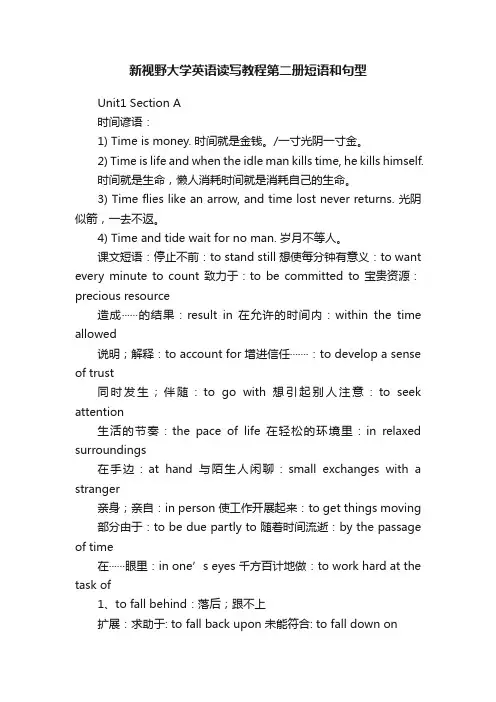
新视野大学英语读写教程第二册短语和句型Unit1 Section A时间谚语:1) Time is money. 时间就是金钱。
/一寸光阴一寸金。
2) Time is life and when the idle man kills time, he kills himself.时间就是生命,懒人消耗时间就是消耗自己的生命。
3) Time flies like an arrow, and time lost never returns. 光阴似箭,一去不返。
4) Time and tide wait for no man. 岁月不等人。
课文短语:停止不前:to stand still 想使每分钟有意义:to want every minute to count 致力于:to be committed to 宝贵资源:precious resource造成······的结果:result in 在允许的时间内:within the time allowed说明;解释:to account for 增进信任·······:to develop a sense of trust同时发生;伴随:to go with 想引起别人注意:to seek attention生活的节奏:the pace of life 在轻松的环境里:in relaxed surroundings在手边:at hand 与陌生人闲聊:small exchanges with a stranger亲身;亲自:in person 使工作开展起来:to get things moving 部分由于:to be due partly to 随着时间流逝:by the passage of time在······眼里:in one’s eyes 千方百计地做:to work hard at the task of1、to fall behind:落后;跟不上扩展:求助于: to fall back upon 未能符合: to fall down on与······失和: to fall out with 失败;落空: to fall througheg. 他之所以被重用,是因为他总能尽职尽责。
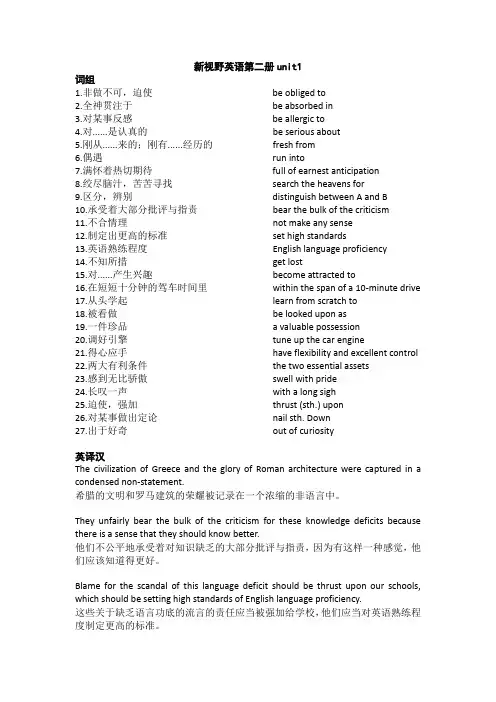
新视野英语第二册unit1词组1.非做不可,迫使be obliged to2.全神贯注于be absorbed in3.对某事反感be allergic to4.对......是认真的be serious about5.刚从......来的;刚有......经历的fresh from6.偶遇run into7.满怀着热切期待full of earnest anticipation8.绞尽脑汁,苦苦寻找search the heavens for9.区分,辨别distinguish between A and B10.承受着大部分批评与指责bear the bulk of the criticism11.不合情理not make any sense12.制定出更高的标准set high standards13.英语熟练程度English language proficiency14.不知所措get lost15.对......产生兴趣become attracted to16.在短短十分钟的驾车时间里within the span of a 10-minute drive17.从头学起learn from scratch to18.被看做be looked upon as19.一件珍品 a valuable possession20.调好引擎tune up the car engine21.得心应手have flexibility and excellent control22.两大有利条件the two essential assets23.感到无比骄傲swell with pride24.长叹一声with a long sigh25.迫使,强加thrust (sth.) upon26.对某事做出定论nail sth. Down27.出于好奇out of curiosity英译汉The civilization of Greece and the glory of Roman architecture were captured in a condensed non-statement.希腊的文明和罗马建筑的荣耀被记录在一个浓缩的非语言中。
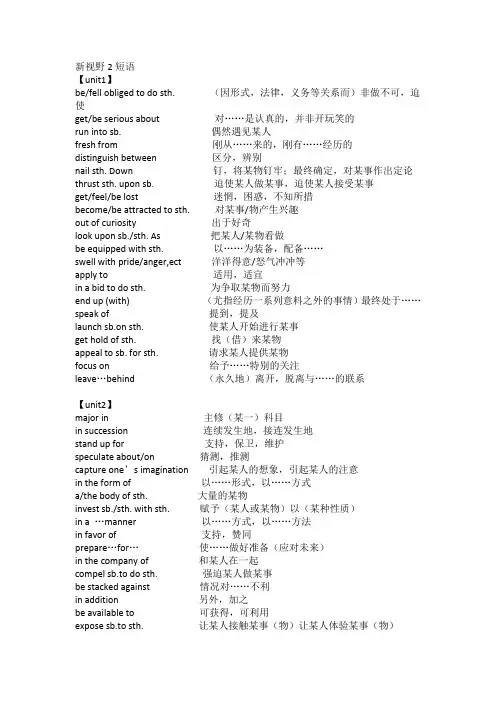
新视野2短语【unit1】be/fell obliged to do sth. (因形式,法律,义务等关系而)非做不可,迫使get/be serious about 对……是认真的,并非开玩笑的run into sb. 偶然遇见某人fresh from 刚从……来的,刚有……经历的distinguish between 区分,辨别nail sth. Down 钉,将某物钉牢;最终确定,对某事作出定论thrust sth. upon sb. 迫使某人做某事,迫使某人接受某事get/feel/be lost 迷惘,困惑,不知所措become/be attracted to sth. 对某事/物产生兴趣out of curiosity 出于好奇look upon sb./sth. As 把某人/某物看做be equipped with sth. 以……为装备,配备……swell with pride/anger,ect 洋洋得意/怒气冲冲等apply to 适用,适宜in a bid to do sth. 为争取某物而努力end up (with) (尤指经历一系列意料之外的事情)最终处于……speak of 提到,提及launch sb.on sth. 使某人开始进行某事get hold of sth. 找(借)来某物appeal to sb. for sth. 请求某人提供某物focus on 给予……特别的关注leave…behind (永久地)离开,脱离与……的联系【unit2】major in 主修(某一)科目in succession 连续发生地,接连发生地stand up for 支持,保卫,维护speculate about/on 猜测,推测capture one’s imagination 引起某人的想象,引起某人的注意in the form of 以……形式,以……方式a/the body of sth. 大量的某物invest sb./sth. with sth. 赋予(某人或某物)以(某种性质)in a …manner 以……方式,以……方法in favor of 支持,赞同prepare…for…使……做好准备(应对未来)in the company of 和某人在一起compel sb.to do sth. 强迫某人做某事be stacked against 情况对……不利in addition 另外,加之be available to 可获得,可利用expose sb.to sth. 让某人接触某事(物)让某人体验某事(物)describe sb./sth. as 把……说成,把……称为have sth.(much/little/nothing) to do with sb./sth. 与某人/事物有关for its own sake 只是为了……本身,没有别的原因(not)bother to do sth. (不想)费心,麻烦做某事【unit3】acquaint oneself with sth.使自己了解某事;使自己知悉某事prior to sth.在某事之前;先于某事base upon / on以…为基础;以…为根据saddle sb. with sth.使某人承担苦差事;使某人负重担keep a distance from保持距离run away from(尤指)秘密地逃跑,出逃get away from摆脱(困难或不愉快的事,或某种限制)distract sb. from sth.分散(某人的)注意力;使(某人)分心give way to被…取代apart from除…之外;此外have an effect on对…产生作用deceive sb. into doing sth.欺骗某人做某事back off放弃;退出wonder at对…感到惊讶fall into(尤指突然)陷入(某种心境)be tired of对(做)某事感到厌烦be strict with sb.对(某人)严格;对(某人)严厉not amount to much/anything/a great deal不太重要;没什么了不起bond with sb.(与某人)培养一种亲密或紧密的关系drift off慢慢入睡can’t bear to do sth.接受不了做某事surrender oneself to sth.听任某事摆布;屈服于某事【unit4】head for(朝…)前进;(向…)去gaze at(常指无意识地)凝视,盯着看stare at凝视;盯着看by accident 偶然;意外地pretend to do sth.假装…;装作…come over sb.(某种感情)突然攫住,突然影响immune to不受…影响的;对…有免疫力的go along with sb./sth.同意;支持expel sb. from sth.(从学校或组织中正式)开除proceed to sth.进而做(参加)某事(活动)take the liberty of doing sth.擅自做某事take sb. by surprise出乎某人意料propose marriage求婚be filled with充满;装满tie the knot结婚be pessimistic about对…持悲观看法(意见)indifferent to(对…)不关心的,不在乎的be inclined to do sth.有做某事的倾向;倾向于做某事take the initiative采取主动;首先采取行动make contact (with sb.)取得联系a bunch of一群;一伙;一束;一串chip in(为共同的活动、支出)凑(钱),凑份子go Dutch (with sb.)(在饭店里)和某人各自结账,平摊费用whip out(很快地)拿出,抽出thrive on乐意做(别人觉得难做或不乐意做的事情)slide into悄悄移到in the pit of one’s stomach在胸口;在心窝【unit5】refer to提到;谈到do one's utmost竭尽全力(做某事)no shortage of不缺少;不缺乏derive sth. from sth.得到,获得(优势或愉快的感受)put off推迟某事;使某事延期take in领会;理解;记住take stock (of sth.)(对形势)作出估计(判断)consult with sb.与某人商量on track在(可能通向成功的)轨迹上get into trouble处于困境get in one’s way挡着某人的路be/feel entitled to (do) sth.使某人有权利做某事;使某人有资格做某事urge sb. to do sth.催促(某人)做某事;力劝(某人)做某事filter out滤除(不需要的文字、信息等)in despair绝望地let sb./sth. down使失望;辜负(别人的信任或期望)shrug off对…满不在乎;对…不屑一顾lose interest in对…失去兴趣tear at撕扯out of the question不可能;不允许care about在乎;在意bring sb./sth. into使处于(某种情形)suffer from经受,承受,蒙受(非常不愉快或痛苦的事)access to进入权;使用权;接触的机会【unit6】impose sth. on sb.将…强加于…be featured in在…中被专题介绍;被特写profit from从…中受益revolve around以…为主题(目的);围绕…be exhausted from因…而筋疲力尽;因…而疲惫不堪come in handy派得上用场be attached to sth./sb. 喜欢(依恋)某物或某人pay a big price to do sth.花很大代价做某事be measured in sth.用某事物来衡量make an effort to do sth.尽量试着做某事;勉强试着做某事rush into冲进;奔进in haste匆忙地;急忙地out of control失去控制settle for勉强接受;将就be dissatisfied with对某事或某人不满意be depressed about对…感到很沮丧struggle to do sth.努力做某事;用力做某事when it comes to在某个方面;说到某事turn out (to be)结果是;最终成为belong to属于(某人)【unit7】be disposed to do sth.愿意做某事;乐于做某事on both counts在两个方面take over接管;接任;接受take a liberty/liberties with sb.与某人相处时太放肆feel at ease with sb.(与某人在一起)感到放松,不拘束make a concession/concessions to为对某事或某想法取得一致意见作出妥协to some extent在某种程度上come down to归结为burst into突然迸发(尤指开始唱歌、哭、笑等)take exception to sth.因某事而生气(烦恼)heat up加热;使变热busy oneself with使自己忙于某事crawl into/out of bed 劳累地爬上床/爬下床overflow with满是;有许多fuss over(为小事)紧张不安,大惊小怪not in all/good conscience凭良心不能做某事(因认为它是错的)think of sb./sth. as认为(是);以为(是);觉得(是)be comprised of包括;由…构成an ounce of略有be unique in(在某方面)独一无二,独特substitute sth. for sth.用…代替…;替换…give sb. (a) five与某人击掌(表示对某事很满意)【unit8】tip the scales使天平(向某人或某物)倾斜cast sb. as(把某人)描写成;(将某人)描述为have relevance to与…有关creep in渐渐影响;逐渐改变persist in坚持;执意make much of过分重视;过分强调in the name of以…的名义in one’s defense为某人作辩护be occupied with忙于做某事in question有疑问的;被怀疑的as is the case with跟…的情况一样isolate sb./sth. from与…隔离;孤立make a contribution作贡献be/become aware of意识到;明白;知道bring about引起;导致;造成give in屈服;让步roll sb. over(使)翻身provide sb. with sth.提供;供应;供给lag behind落后come along到达;出现deduct sth. from sth.从…扣除on the eve of在…前日;在…前夕smell of有…气味;发出…气味fill out填写(正式文件、表格等)。

最新版第三版新视野第二册单词表tediousa.冗长乏味的obligevt.迫使;使负有义务absorbeda.极感兴趣的;全神贯注的;专注的allergica. 1不喜欢某事;对某事反感;2 过敏的excursionn.短途出行;远足earnesta.非常认真的;郑重其事的exclaim v.(由于惊奇、气愤或激动)呼喊,惊叫whoa interj.哎呀,哇(表示惊讶或认为某事物令人赞叹)civilizationn.文明(社会)architecturen. 1建筑风格;建筑式样;2建筑学capturevt. 1 (用文字或图片)记录下,描述,捕捉;2俘虏;逮捕condense vt.将(讲话或文章)压缩UNIT1 A第二册condensed a.压缩的exceed deficitn. 1 (素质、技能或能力的)缺乏,不足;vt.超过;超出2赤字;亏损;逆差distress dumbn.忧虑;苦恼;悲伤 a.愚蠢的disti nguish groceryv.区分;辨别n. 1 超级市场;disti nctive 2食品杂货a.与众不同的;特殊stati onary的;特别的 a.不(移)动的;静complime ntary 止的a. 1免费赠送的;stati onery2赞美的;钦佩的n.文具compleme ntary pada.互为补充的;互补n. 1便笺本;拍纸的簿;2垫;衬垫;护bulk 垫n.(某物的)大部分,album多半n.(收存照片、邮票criticism 等的)簿,册n.批评;批判;指责proclaimvt.宣称;宣布;声明sea ndaln. 1 (尤指当局本应改变的)令人震惊的事,引起愤慨的事;2 (尤指牵涉知名人士的)丑闻,丑事thrust v.猛推;猛塞proficie ncyn.熟练;精通moreoverad. 而且;再者;此外evide ntlyad.明显地;显然exposuren. 1接触;体验;2暴露adequatea.足够的;充分的;合乎需要的adequatelyad.足够地;充分地competenta.合格的;能干的jerkn.猛的一动;猝然一动jerkya.(在行进中)不平稳的,颠簸的functionn.(事物的)功能,作用;(某人的)职责vi. 正常工作;正常运转spann.(两个日期或事件之间的)时距,期间scratch n. 1从零开始;从头开始;白手起家;刮痕,划痕tune a.(语法中的)虚拟语气的n.(语法中vt. 1调整,调节(发的)虚拟语气动机)使达到最佳状be / feel obliged t 态;2为(乐器)调o do sth.音,定弦(因形势、法律、义务adjust 等关系而)非做不可,v.调整;调节迫使vi. 适应get/be serious about desti nati onn.目的地;终点对…是认真的;并非开precise 玩笑的a.精确的;准确的run in to sb.ben eficial 偶然遇见某人a.有利的;有帮助的;fresh from有用的刚从…来的;刚有…经asset 历的n. 1有利条件;长disti nguish betwee n 处;2资产;财产区分;辨别sour n ail sth. dow na.酸的1钉;将某物钉牢2最终确疋;对某事作出定论thrust sth. upon sb 出于好奇look upon sb./sth. as■把某人/某物看作迫使某人做某事;迫使be equipped with s 某人接受某事th.get / feel / be l 以…为装备;配备…ost swell with pride /迷惘;困惑;不知所an ger, etc.措洋洋得意/怒气冲冲become / be attrac 等ted to sth.对某事/物产生兴趣out of curiosityUNIT 1 Bactivist 的n.活动家;积极分mysteriously子ad.神秘地;难以解释mysterious 地a.神秘的;难以解释assass in atevt.暗杀;行刺autobiographyn.自传householdn.家庭;一家人main streama.主流的n.主流specificallyad. 1 特定地;具体地;专门地;2详尽地;明确地in adequatea.(对某一特定目的而言)不够好的,不足的,不强的sketchv. 1 概述;简述;2 (给…画)速写;(给…画)素描n.概略;大要rallyn.大型公众集会(尤指支持某政治观点、抗议等在户外举行的集会)fun cti onala.正常运转的bidn. 1 (为争取某物而作出的)努力;2 (尤指拍卖的)出价desperatea. 1 (由于处在绝境而)不惜冒险的,拼命的,绝望的;2非常需要的;极其需要的devisevt.想出;设计;发明schemen.(为取得某项成功而制定的)计划cluen.(帮助理解和找到moisture答案的)线索n.水分;水汽;湿气quest advisablen.(长期的)探索, a.可取的;适当的;追求明智的appeal advisoryvi.恳请;恳求;呼 a.顾问的;咨询的吁crudeskim a. 1 粗制的;粗糙v.浏览,略读(以找的;2未经提炼的;出主要信息)未经加工的;天然的n egotiate quotati onv. 1 (成功地)解决,n.引语;引文处理,克服;2 (尤quotati on mark指在商业或政治上)谈n.引号判,协商recallformat v.回想;回忆起n.设计;安排;组织log方式vt.正式记录(事件、moist 事实等)a.潮润的;微湿的;v.伐木;砍伐湿润的repetiti onliteracyn.有读写能力;有文n.集中精力;专心;专注flue nt化 a.(语言或文字)流depict 畅熟练的vt.描写;描述;描flue ntly绘ad.(语言或文字)流acquisiti on 畅熟练地n.(知识、技能的)poverty获得,习得n.贫穷;贫困marvelous ignorancea.极好的;绝妙的;n.无知;愚昧了不起的horiz onsuccessive n. 1 (思想、知识以a.连续的;连接的;及经验的)范围,界限;相继的眼界;2地平线con fusi on expandn.困惑;混乱v.(使)扩大;(使)dimi nish 增加v.(使)减少;(使)apply to变小适用;适宜concen trati on in a bid to do s为争取某物而努力end up (with)get hold of sth. 找(借)来某物(尤指经历一系列意appeal to sb. for料之外的事情)最终处sth.于…请求某人提供某物speak of focus on提到;提及给予…特别的关注launch sb. on sth. leave … behind(永久地)离开,脱使某人开始进行某离与…的联系UNIT 2 Aacco unting n.可能的事情;很可n. 会计;会计学能发生的事情;前景calculate defectvt. 1估计;预测;vi.背叛;叛逃推测;2计算;核算n.缺点;欠缺;不足boost 之处vt.促进;推动;使兴applied旺 a.(学科)应用的,prospect 实用的bet (bet, bet)vt.肯定persistvi. 1继续存在;持续;2坚持;执意accelerate v.(使)加快;促进successionn. 一连串,一系列(同类型的人或物)liberala. 1文科;2心胸宽广的;开明的logicala.合乎逻辑的;合理的bounda. 一定的;几乎肯定的dominanta.有优势的;占统治地位的pillar n. 1 (信仰或思想)非常重要的部分;2柱子;支柱vivida.清晰的;生动的compelvt.强迫;迫使compelli nga.有强烈吸引力的;引人入胜的promotevt.支持;鼓励;提倡speculatev.思索;沉思;推测; 猜测mysteryn.不可思议的事物;无法解释的事物;谜destructio nn.毁灭;摧毁;破坏巧妙的,简洁的;2优美的;高雅的uncon scious an alysisa.潜意识的;下意识n.分析的;无意识的spectacular destructive a.引人入胜的;非常a.破坏性的;毁灭性壮观的的brandarchitect n.品牌;商标n.建筑师in vest philosopher v.投资n.哲学家;哲人in sightIan dscape n. 1洞察力;领悟n. 1 风景照;风景力;2顿悟;洞悉;画;2 (陆上的)风见解景,景致,景色therebyfertile ad.因此;从而;借a. 1富有成果的;富此有想象力的;2 (土scope地)肥沃的,富饶的n.(活动、机构或学elega nt 术)范围a. 1 (想法或计划)un dertakeself-destructio n n.自残;自毁vt.承担;着手做can didate n. 候选人n. 1积蓄;储备;2 (人造的)水库;(天然)蓄水湖breakthrough outsta ndingn.突破;重大发现; a.杰出的;出众的;重大成就显著的barrier major inn.障碍主修(某一)科目liable in successi ona.可能(易于)做某连续发生地;接连发生事的地establishme nt sta nd up forn. 建立;创立;设立支持;保卫;维护dea n speculate about / o n.院长;系主任;教n务长猜测;推测sole capture one' s imaga.唯一的;仅有的in ati onsolely 引起某人的想象;吸引ad.只;唯地;仅某人的注意仅in the form of reservoir 以…形式;以…方式a / the body of sth. 大量的某物in favor of支持;赞同prepare ... for ...in vest sb. / sth. 使…做好准备(应对未with sth. 来)赋予(某人或某物)以in the company of (某种性质)in a ... manner 和某人在起以…方式;以…方法UNIT 2 Bconsensus 校订n. 致冋意reformshri nk (shra nk, shru vt. 改革;革新;改nk) 进n.改革;革新;vi.(数量、价值、范改进围)减少,下降,缩小realisticv.(使)收缩;(使) a.实际的;现实可行缩小的revise criticvt. 1 改变(观点、n. 1 批评者;判断);2修订;订正;2 (书、电影、戏剧等的)评论家,评论员surveyn.调查upsiden.(不良局面中)好的方面upside downad.颠倒地;倒置地con firmvt. 证实faten.命运;(尤指)厄运quivervi.颤抖;发抖motive n.(尤指隐藏的)动机,原因,目的sufficie nt a.足够的;充足的presumablyad.可能;大概;也许ack no wledgevt. 1 承认;2 (公开)感谢en rollv.招(生);吸收(成员);注册(学习)bachelor n.未婚男子;单身汉bachelor' s degreen. 学士学位dilemman.(必须做出困难决定的)窘境,困境accumulate vt. 积累;积聚vi.堆积;聚积ration.比例;比率in flati onn.通货膨胀accordvt. 1给予(关照或其他待遇);2与--------------------- 一致;与…相符likewisead.同样地;照样地curriculumn.(某个学校的)课程primea. 首要的;最重要的urba na.城镇的;城市的;发生在城市的age ntn.代理人;代理商carpentern. 木匠;木工mecha nicn.机修工;技工cablen.电缆in stall vt.安装;设置in stallern.安装工gloomya.沮丧的;悲观的cynicala. 1愤世嫉俗的;冷嘲热讽的;2 悲观的breadthn.广泛性;广度breedn.(人或物的)种类, 类型saken.目的literallyad.确实地;真正地;不加夸张地botherv. 1费心;麻烦;2 (使)担心;(使)议,议案in vestme nt n.投资;投入的资生气;(使)苦恼本vt.打扰;烦扰compel sb. to do recruit sth.V.招聘;吸收,招收强迫某人做某事(新成员)be stacked against orie nt 情况对…不利vt.重视;着重;以…in additi on为目的另外;加之orie nted be available toa. 重视…的;着重…可获得;可利用的expose sb. to sth. evaluatevt.评价;评估让某人接触某事(物);equati on 让某人体验某事n.(涉及平衡的)影(物)响因素,综合体describe sb. / sth.proposal asn.(尤指某团体必须把…说成;把…称为考虑的正式)计划,建have sth. (much /little / nothing) t 只是为了…本身;没有o do with sb. / 别的原因sth. (not) bother to do与某人/某事物有关;与sth.某人/某事物有联系(不想)费心,麻烦做for its own sake 某事UNIT 3 Aodysseyn. 1对人生有教益的一连串经历;艰难历程;2漫长的历险旅程phasen.阶段;时期labelvt.贴标签于;用标签标明parallelvt. 1与…相当或相似;2与…平行adolesce nee n.青春期peculiar a. 1 为某人/某地/某事物所特有的;2奇怪的;异常的acquaintvt.介绍;使认识;使了解previousa.以前的;先前的in ducti onn.就职;入门;就职仪式sen siblea.合理的;切合实际的;明智的equivalenta.等值的;同等的;相当的n.等价物;等同物;对应物so-calleda.如此称呼的;号称的radicala. 1 (改变或方式)彻底的,根本的;2激进的;前卫的agendan.日常工作事项quitv.离开(工作岗位、学校等);离任;离校shift v.(使)移动;(使)转移(地点或位置)n.(想法、做法等的)改变prior a.先前的;之前的;事先的framevt.(小心措辞以)表达n.框架;边框spousen.配偶stabilityn.稳固;稳定statica.不动的;不变化的;不发展的;静(止)的proporti onn.部分;份额saddle v.给(马)装鞍具;装上马鞍n.马鞍;(自行车、摩托车等的)车座heirn.继承人rebeln. 造反者;反叛者vi.造反;反抗(权威或常规)rebelliousa.叛逆的;反叛的;反抗的resentvt.对…感到愤恨(不满)fluida.不固定的;易变的n.液(体)resortvi.采取,诉诸(不好的事物)n.度假胜地distractvt.分散,转移(注意力)allowa neen. 1体谅;原谅;2定期补贴;津贴tra nsiti onn.过渡;转变;变迁predictvt.预言;预料;预测guideli nen.指导方针;指导原则versi onn. 1版本;改编形式;2 (根据个人的观点对事件的)描述,说法statusn.社会地位(尤指与其他人相比)stablea.稳定的;不变的boomvi.(国家、地区或行业)繁荣,迅速发展apart ad.(空间、时间方面)成距离,相间隔a.分离的;分隔的implicitva.暗含其中的;不明言的con sideri ngprep. & conj.考虑到;鉴于con temporarya.当代的wit nessvt. 1是发生(某事件)的时间或地点;2目击,亲眼看见(尤指罪行或事故发生)deceivevt.欺骗outsetn.从开头时;从一开始r e sum en.个人简历up-to-datea.包含最新信息的rei nforcevt.加强,强化(观点、思想或感觉)acquaint oneself wit h sth.使自己了解某事;使自己知悉某事prior to sth.在某事之前;先于某事base upon / on以…为基础;以…为根据saddle sb. with sth ■使某人承担苦差事;使使(某人)分心give way to 被…取代某人负重担apart fromkeep a distanee fro 除…之外;此外m have an effect on保持距离run away from 对…产生作用(尤指)秘密地逃跑,deceive sb. into do 出逃ing sth.get away from 欺骗某人做某事摆脱(困难或不愉快的back off事,或某种限制)放弃;退出distract sb. from st wonder ath. 对…感到惊讶分散(某人的)注意力;UNIT 3 Bexile vt.(尤指因政治原因n.流放,放逐,流亡而)迫使(某人)流亡(通常指因政治原国外因)hesitatevi.犹豫;踌躇;迟疑feasiblea.可行的;可能的coden. 1准则;规范;行为规则;2密码;代码;代号hollowa. 1无意义的;虚有其表的;2 空的;中空的;空心的miserablea.苦恼的;痛苦的;难受的volca non.火山eruptvi. 1 (火山)爆发,喷发;2 (搏斗、暴力事件、噪音等)突然发生,爆发snap vi.突然发怒;突然崩溃seriesn.系列;连续发生的一组类似事件manuala.手工的;体力的banquetn.宴会;盛宴maintenancen.(建筑物、机器或设备的)维修,养护,保养dairyn.牛奶场;乳品厂deckn.甲板commerciala.商业的;商务的affirmvt.确认;证实;断言…属实refine 廊,走廊resig nv. 1 使自己顺从于vt. 1 (逐渐地、微小地)改进,完善;(做某事);安于(无2净化;提炼法改变的不愉快状refined 况);2辞(职);放a. 1 优雅的;有教养弃(工作或职位)的;2 精炼的;精制over ni ght的ad.夜里;在夜间coarse restlessa. 1 粗俗的;粗鲁 a.焦躁不安的;不耐的; 2 粗的;粗糙的烦的orga nic rousea.不使用化肥(农药)vt. 1激励,使振奋生产的;有机的;绿色(尤指对方很疲倦或的不愿意做某事时);dem on strate 2唤醒vt. 1 说明;证明;deputy证实;论证;2示范;n. 1 (美国)县治安演示官助理;2代理人;porch 副手;副职n.(房屋前后的)游somehowad. 1由于某种不明原因;不知为什么;2用某种方法;不知refreshvt.使恢复精力;使提神;使清凉怎么地refreshedin tegrity a.精神振作的;精力n.耿直;正直诚实恢复的cargo alertn.(船、飞机或卡车 a.警惕的;警觉的装载的)货物torturetrail n.(身心所受的)折v.拖;拉;拖在后面磨煎敖,八、、八、、trailer vt.拷打;拷问;对…n.拖车;挂车施酷刑逼供air-c on diti oning surre ndern.空调系统v.投降somewhat fairyad.有点儿;有几分n.仙子;小精灵soak fairy talev.(使)湿透;浸湿n.童话;神话;神仙drift 故事vi.(慢慢地)漂移,cane漂流n.(用来制作家具、篮子的)藤条statuen.雕像;塑像great deal不太重要;没什么了不起fall in to bond with sb.(尤指突然)陷入(某(与某人)培养种种心境)亲密或紧密的关系be tired of drift off对(做)某事感到厌慢慢入睡烦can' t bear to dobe strict with sb. sth.接受不了做某事对(某人)严格;对(某surre nder on eself to 人)严厉sth.not amount to muc 听任某事摆布;屈服于h / any thi ng / a 某事UNIT 4 Aclassic cutea.经典的 a.漂亮的;可爱的roma nee gazen. 1 爱情故事;vi.(常指无意识地)2爱情;恋爱凝视,盯着看weirda.古怪的;奇异的cautiousa.小心的;谨慎的;慎重的dyn amica. 1精力充沛的;有创新思想的;志在成功的;2不断移动的;不断变化的charmvt.迷住;吸引n.魅力;魔力;吸引力;可爱之处temptvt.怂恿;利诱tempt inga.诱人的;吸引人的reputationn.名誉;名望superior a.更好的;更强的;更有效的semestern.(尤指美国中学和大学的)一学期,半学年stalea. 1不再有趣的;没有新意的;乏味的;2不新鲜的comp on entn.机器、系统等的零件;成分;组成部分ambitious a.有抱负的;有雄心大志的;野心勃勃的sexual a.性的;与性(生活)有关的superba.极好的;出色的;卓越的immunea. 1不受影响的;2免疫的;有免疫力vt.批准;认可vi.赞许;赞成;同意的grantcon seque ntly vt.给予;准予ad.结果;因此;所n.(尤指政府发给的)以补助金,拨款disgust coordi naten.厌恶;气愤;反感vt.调节;协调proceed corevi. 1 继续进行;继n.最重要(或最基本)续做;2 (向某一方的部分;核心向)前进,移动deservelodge vt. 1应得,应受到vt.正式提出(投诉、(奖赏或惩罚);要求等) 2 (建议、观点或计V.(通过付住宿费)借戈ij)值得考虑、注意住;(为某人)提供住等宿libertybehalf n. 1擅自的行为;冒n.代表某人犯的举动;放肆的行approve 为;2自由;自由权displayvt.显示,显露(某种情感、态度或特质)n.展览;陈列;展示disapprove vi.不赞同;反对palmn.棕榈树weavev. 1编造(故事等);2织;编织blurn.模糊的记忆;记不清的事情v. (使)模糊;(使)看不清kn eelvi. 跪着;跪下proposev.(尤指正式向某人)求婚vt.提议;建议con fessv.承认(使自己尴尬的事情)knotn. 1 (线、绳、布等打成的)结;2 (恐惧、愤怒等导致的)紧张(感)pessimistica.悲观的;悲观主义的faithfula.(对某人、信念、政党等)忠诚的,忠实的hon eym oonn.蜜月comme neev. 开始;着手bloomvi. 开花;(花)盛开head for(朝…)前进;(向…)去gaze at(常指无意识地)凝视,盯着看stare at凝视;盯着看by accide nt偶然;意外地pretend to do sth.假装…;装作…come over sb.(某种感情)突然攫住,突然影响immune to不受…影响的;对…有免疫力的go along with sb./ sth. 同意;支持expel sb. from sth.(从学校或组织中正式)开除proceed to sth.进而做(参加)某事(活动)take the liberty ofdoing sth.擅自做某事take sb. by surpris e出乎某人意料propose marriage求婚be filled with充满;装满tie the knot结婚be pessimistic about对…持悲观看法(意见)UNIT 4 Bin differe nta.不关心的;不在乎的impulsen.冲动;突然的欲n. 1 主动权;2 自主决断能力;主动性con tactn.联系;联络;交往vt.(写信或打电话)联系(某人)in cli nevi.有意做;倾向于in cli neda.有…意向的;倾向于…的dari nga.勇敢的;大胆的no ti onn.概念;观点;看法abno rmalspark n. 1生气;活力;2火花;火星reck onvt. 1认为;以为;2估算;估计idlea. 1不工作的;空闲的;2不认真的;漫无目的的a. 不正常的;反常的;phenomenon 变态的n.现象n. 1赞成;赞许;n. 1 一群;一伙;leisure 2批准;核准;认可2 一束;一串alter naten.空闲;闲暇;业余时间occasionn. 1特殊(或重大)场合;特殊(或重大)事件;2 (某事发生的)时刻,时候,时节bonusn. 1意外收获;额外的好处;2奖金;红利forgevt. 1形成,缔结(尤指与其他人、团队或国家形成牢固的关系);2伪造,假冒v. (使)轮流;(使)交替a.间隔的n.替换(人)物circulatevi. (尤指在聚会上)应酬,来回周旋v.(使)循环un dergovt.经历(变化的过程)prelimi narya.(先于某物主要或最重要部分)初步的,预备性的,开端的plural(尤指文书、笔记a.多种的;多元的;等)多数的n.形形色色的人;各种各样的东西chipv. 切下,削下,凿下(碎片、屑片)n.集成电路片;芯片clarifyvt.澄清;讲清楚;阐明defi nitea. 1 肯定的;一定的;2清楚的;明确的whipvt.突然移动(挪开)frownvi. 皱眉hastya.匆忙的;仓促的hastilyad.飞快地;仓促地exceed in glyad.非常;极其conveyvt.表达;传递;传达blastn. 1欢乐而刺激的经历;2 一阵疾风;一股气流thrivevi.兴旺;欣欣向荣;茁壮成长dime nsionn.(形势等的)方面, 部分formulan. 1准则;方案;2公式;方程式;分子式nonsensen.荒谬的想法(看法);胡说;废话patvt.轻拍pitn. 1 (某物表面的)微小凹痕;2 (尤指在地上挖出的)坑conquervt.克服;制服con cealvt.隐藏,隐瞒(真实感情或真相)thrillvt.使兴奋;使激动n.(突然而又强烈的)激动,狂喜;令人激动的事thrilleda.非常激动的;非常幸福的;非常高兴的indifferent to(对…)不关心的,不在乎的be inclined to do sth.有做某事的倾向;倾向于做某事take the initiative 米取主动;首先米取行动make con tact (with sb.)取得联系a bunch of一群;一伙;一束;一串chip in(为共同的活动、支出)凑(钱),凑份子go Dutch (with sb. )(在饭店里)和某人各自结账,平摊费用whip out(很快地)拿出,抽slide into出悄悄移到thrive on in the pit of one 乐意做(别人觉得难做's stomach或不乐意做的事情)在胸口;在心窝UNIT 5 Aman ipulatevt.操纵,控制(某人的思想和行为)defyvt. 1 违反;2 违抗;不服从con tradictv.与…抵触;与…矛盾;违背recessionn. (经济)衰退,萧条grave a.严重的;重大的;严峻的n. 坟墓;墓穴n astya.不友善的;不好的;恶毒的tonen.(说话的)语气,口气,腔调resumev.(中断之后)继续,重新开始depictionn.描写;描述;描绘gap别;2缺口;开口;n. 1 差距;差额;差裂缝n. 1欲望;爱好; paradox 2 胃口;食欲n.自相矛盾(的情disguise况)vt.装扮;假扮oddsn.(与某物)不一致, 相矛盾perspectiven.(思考问题的)角度,观点,想法uprighta. 1 正直的;诚实的;2垂直的;笔直的urgevt.极力劝告;敦促;催促suspendvt. 1暂停;中止;2 (尤指因违规)使… 暂时停学(停职)appetite in vadev. 1 (尤指不受欢迎地)大量涌入,蜂拥而至;2武力入侵;侵略;侵占utmostn.极度;极限;最大可能cerealn.(通常与牛奶一起吃、作为早餐的)谷类食品cruisen.乘船度假shortagen.短缺;不足;缺乏ceme ntvt.加强,巩固(关系、看法等)n.水泥derive v.撒scattereda.散布的;分散的vt.(从某物中)得到,retain获得vt.保留;保有;继续V.源自;源于拥有no urish well-bei ngvt.滋养;给…营养n.舒适,健康,幸福compact in gredie nta.小而紧凑的n. 1 (兀成某事的)explicit 要素,因素;2 (烹a.清楚明确的;直截调用的)成分,原料了当的hin derecho vt.阻碍;妨碍;阻vt.附和(别人的观止点)con sultvi.(声首)回响;发v.咨询;请教出回声in putstock n. 1 (想法、建议或n. 1储备;储备物;信息的)投入,输入;2股份 2 (输入计算机的)scatter 信息,数据输入opti onn.选择;可选择的东西choppya.波浪起伏的;波浪滔滔的admi nistratio n refer ton. 1 经营过程;管理提到;谈到过程;2 (某一时期do on e's utmost 的)政府竭尽全力(做某事)ego no shortage ofn.自我;自我意识不缺少;不缺乏urge nt derive sth. from st a.紧急的;急迫的;h.需迅速处理的得到,获得(优势或愉urge ntly 快的感受)ad.紧急地;急迫地put offtackle 推迟某事;使某事延vt.处理,对付(难期题)take inlegal 领会;理解;记住a. 1法律的;与法律take stock (of sth.)有关的;2法律允许的;合法的;法律规定(对形势)作出估计的(判断)con suit with sb. 与某人商量on track get in to trouble 处于困境get in one' s way在(可能通向成功的)轨迹上挡着某人的路UNIT 5 Bcatalog 题n.商品目录;购物指filter南vt.过滤feature proben.特点;特征;特色n.探索;探查;调查en title sheervt.给(某人)权利; a.(某物)之重/之大(某人)有资格等(用于强调)scout profilevt.侦查;搜索n.人物简介;(某地方issue 的)概况vt.发表(声明);颁submit布,发出(命令、警告vt.呈交,递交,呈递等)(计划等)n.议题;争论的问corporati onn.大型公司;大企业; 企业集团in stallme ntn.分期付款的一期tamea. 1平淡的;枯燥乏味的;2 (动物)驯化的,(由人)驯养的vitaminn.维生素;维他命artificiala.人造的;人工的;假的rodn.钓竿;杆;棒riflen.来复枪;步枪stemn.(植物的)茎,根, 柄wardroben.衣柜;衣橱calculator n.计算器triflen.琐碎的事;无价值的东西outputn.产量;产品fundn. 基金;专款ongoinga.继续进行的;不断发展的pri ncipaln.本金a.最重要的;首要的; 主要的pen altyn.(因违反法律、规则或合约受到的)惩罚,处罚sanctionn. 1 处罚;惩罚;2 (对某国的)制裁imposevt.强制推行;强制实prohibitvt. 1使不可能;阻止;2禁止行manu factureaccorda nee vt. 1编造(虚假情n.依照;依据;与…况、借口等);2 (用致机器大量)生产,制gravity 造n. 1 (局势的)严重cripple性;2重力;引力vt.严重损毁;削弱crisis ban kruptn.危机;紧要关头 a.倒闭的;破产的visi on ble ndn. 1构想;设想;念n.(不同事物的)融头;2视力合aut ono mous dissolvea. 1有自主能力的;v. 1 (使)消失;(使)自主的;2 (地方或破灭;2 (使)溶解机构)自治的isolateshrug vt.孤立;隔离v.耸肩(表示不知道isolated或不在乎) a.孤立的suspicionn.怀疑;嫌疑remedyvt.补救;纠正;改善n.补救法proceduren.(尤指正确的或通常的做事)步骤,手续severea. 1非常严格的;严厉的;2很严重的illusi onn.(尤其对自己的)幻觉,幻想staggervt.(使某人)惊愕,震惊staggeringlyad.令人极其震惊地;难以置信地be / feel entitled to (do) sth. 使某人有权利做某事;使某人有资格做某事urge sb. to do st h.催促(某人)做某事;力劝(某人)做某事filter out滤除(不需要的文字、信息等)in despair绝望地let sb. / sth. down使失望;辜负(别人的信任或期望)shrug off对…满不在乎;对…不屑一顾lose interest in对…失去兴趣tear at撕扯to使处于(某种情形)suffer fromout of the questi on 经受,承受,蒙受(非常不愉快或痛苦的不可能;不允许事)care about access to在乎;在意进入权;使用权;接触bring sb. / sth. in 的机会UNIT 6 Arival territorya.竞争的;对抗的n.领土;版图;领地n.对手;竞争者opponentsec on dary n. 1 (竞争、比赛等a.次要的;从属的的)敌手,对手;2反imperial 对者a.帝国的;皇帝的motivateraid vt.激励;激发…的积n.突袭;袭击极性vt.(军队)突然袭loyal击 a.忠贞的;忠实的;忠诚的vessel n.船;舰险事物的)攻克,征服summitgenius n. 1某事物的顶峰;n. 1 天才;天赋;某事物的极点;2首2有天才的人;天才脑会议;最咼级会议;人物峰会con victi on en lighte nn.坚疋的信仰(主vt.启发;指导;教张)导validate en lighte ningvt.证实;使生效;使 a.具启发性的合法化publicati onexcepti on n. 1书;杂志;著作; n.例外;除外出版物;2出版vetera n irrati onala.经验丰富的;老练 a.非理性的;不合理的的;荒谬的n.老兵;退伍军人in vestigateconq uest vt.查明,调查,侦查n. 1击败;征服;攻(犯罪、事故或科学问占;2 (对艰难、危题的真相)in vestigati onn.(对犯罪、事故或科学问题等进行的正fluctuatevi.波动;起伏;涨落式的)调查,侦查modifymarshal vt.改动;修改;更vt.整理(思路、想法改等)visualbehavioral a.视觉的;视力的a.行为的;行为方式protest的v. 1坚持说;力言;profit 2公开反对;抗议v.使…得到;有利cli ng于vi. 1坚持,墨守(某n.利润;收益;盈利事物);2 (尤指感觉revolve 不安全而)紧紧抓住v.(使)旋转(抱住)preserve factorvt.维护;保护;保n.因素;要素存undern eathsessi on prep. 1 在…里面;n.(一批人参加某项在…背后;2 在…下活动的)一段时间面;在…底下temporarya.暂时的;临时的restorevt.恢复impleme ntvt.实施;执行;贯彻delegatevt.授权,委托(权限)(给下级);下放(权力)n.代表prunevt.(尤指为缩减规模或降低成本)削减,裁减discardvt.扔掉;弃置outwarda.外表的;表面的prejudicevt.使有偏见;使有成见n.成见;偏见prejudiceda.有成见的;有偏见的dosen. 1 一份;一点;2 (药物的)一剂,一服;一次服用量respectivea.各自的;分别的impose sth. on sb.将…强加于…be featured in在…中被专题介绍;被特写profit from从…中受益revolve around以…为主题(目的);围绕…be exhausted from 花很大代价做某事be measured in sth 因…而筋疲力尽;因…而疲惫不堪come in handy 用某事物来衡量make an effort to派得上用场do sth.be attached to sth. 尽量试着做某事;勉强/ sb. 试着做某事喜欢(依恋)某物或某人pay a big price todo sth.UNIT 6 Bhaste n.(化学物质)酸n.匆忙;仓促hi ntven ture n.暗示vt.小心地说;谨慎地remote做 a. 1 无所知;毫无vi.冒风险(去某兴趣;毫无打算;2偏处)僻的;偏远的acid distribute。
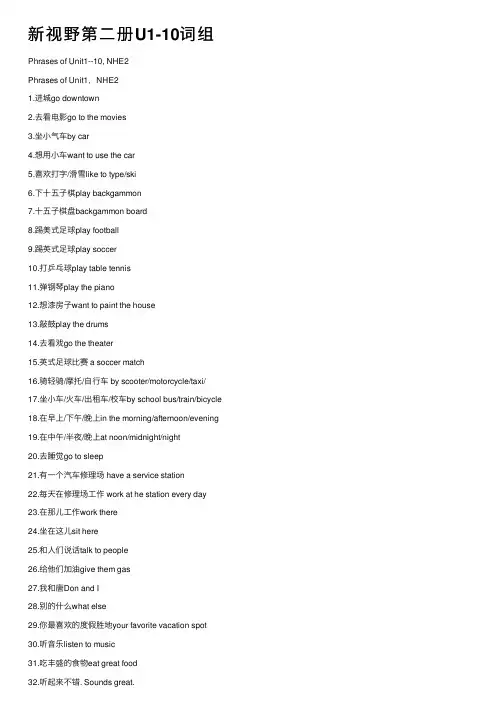
新视野第⼆册U1-10词组Phrases of Unit1--10, NHE2Phrases of Unit1,NHE21.进城go downtown2.去看电影go to the movies3.坐⼩⽓车by car4.想⽤⼩车want to use the car5.喜欢打字/滑雪like to type/ski6.下⼗五⼦棋play backgammon7.⼗五⼦棋盘backgammon board8.踢美式⾜球play football9.踢英式⾜球play soccer10.打乒乓球play table tennis11.弹钢琴play the piano12.想漆房⼦want to paint the house13.敲⿎play the drums14.去看戏go the theater15.英式⾜球⽐赛 a soccer match16.骑轻骑/摩托/⾃⾏车 by scooter/motorcycle/taxi/17.坐⼩车/⽕车/出租车/校车by school bus/train/bicycle18.在早上/下午/晚上in the morning/afternoon/evening19.在中午/半夜/晚上at noon/midnight/night20.去睡觉go to sleep21.有⼀个汽车修理场 have a service station22.每天在修理场⼯作 work at he station every day23.在那⼉⼯作work there24.坐在这⼉sit here25.和⼈们说话talk to people26.给他们加油give them gas27.我和唐Don and I28.别的什么what else29.你最喜欢的度假胜地your favorite vacation spot30.听⾳乐listen to music31.吃丰盛的⾷物eat great food32.听起来不错. Sounds great.33.装修房⼦fix up the house34.迟睡sleep late35.露营和远⾜camp and hike36.看演出和参观博物馆see shows and museums37.骑马ride horses38.打⾼尔夫球play golf139.去游泳池/动物园go to the pool/zoo40.外出度假go away on vacation41.去纽约go to New York42.去海滨(go) to the beach43.祝假期愉快. Enjoy your vacation .44.今年this year45.喜欢和我的裙⼦相配的鞋⼦like my skirt with these shoes46.穿⼀件紫⾊衬衫⼯作 work in a purple skirt47.去做礼拜go to churchPhrases of Unit2, NHE21.⼀位⽹球运动员 a tennis player2.⼀位卡车驾驶员 a truck driver3.开出租车/汽车/卡车drive a taxi/bus/truck4.送⽐萨饼/邮件deliver pizza / mail5.⼀个报童 a newspaper boy6.送报deliver newspapers7.招待⼈进餐wait on tables8.写书write books9.靠做…谋⽣do sth for a living10.学⼀⾸歌study a song11.步⾏去⼯作walk to work12.⼯作⼗⼩时work ten hours13.打牌play cards14.喜欢赛车like sports cars15.我饿/ 很饿. I'm hungry/starving .16.买点⼼get a snack17.我来买单. I'll pay .18.⼀个草莓冰激林蛋筒 a strawberry ice cream cone19.想要带⾛的want take-out20.橘⼦汁orange juice21.热狗 a hot dog22.烤奶酪grilled cheese23.喝杯果汁have a glass of juice24.⼀块⾦枪鱼三明治 a tuna sandwich25.敢拦⼀只熊dare to stop a grizzly bear Phrases of Unit3, NHE21.在周六晚上举重lift weights on Saturday night2.拥有这个俱乐部own this club3.总是起得早always get up early4.从不睡得迟never go to bed late25.在节⾷be on a diet6.吃顿丰盛的早饭have a good breakfast7.吃早饭have breakfast8.早饭吃鸡蛋/喝⽜奶have eggs/ milk for breakfast9.从学校步⾏/开车回家walk/drive home from school10.经常吃菠萝often have pineapple11.放学后踢⾜球play football after school12.真不敢相信come on13.我在开玩笑. I'm joking.14.坐在桌边吃eat at the table15.通常努⼒学习(⼯作) usually work hard16.看上去漂亮look pretty17.谈得太多talk too much18.睡⼀下午的觉sleep all afternoon19.抽只烟have a cigarette20.从不喝酒never drink21.与某⼈外出go out with sb22.⼀个…,另⼀个one…the other23.在家帮做家务help in he house24.整理床铺make the bed25.晚饭后跑⼀⼩时的步run for an hour after dinner26.去浴室淋浴o to the bathroom and take a shower27.刮脸shave one’s face28.梳头comb one’s hair29.穿⾐服get dressed30.脱睡⾐take off the pajamas31.穿内⾐put on underwear32.去蒙市⼏天go to Montreal for a few days33.讨厌买票hate buying tickets34.问他下班⽕车何时离开ask him when the next train leave35.到达…arrive at / in36.问他⽕车是否直接去蒙市ask him if the train go directly to Montreal37.换⽕车change trains38.问他它多少钱ask him how much it costs39.⼀张单程/双程票 a one-way/round-trip ticket40.为某⼈做⼀切do everything for sb41.有益be helpful42.打开信open the mail43.说西班⽛语speak Spanish44.谱曲write music345.请他以后给我回电话ask him to call me back later46.给某⼈捎⼝信give sb a message47.那条线很忙. That line is busy.48.你能不挂断么? Will you hold ?49.地区代码area code50.Pam在家么? Is Pam home ?51.留个⼝信leave sb a message52.叫他打电话给我have him to call me53.Max的电话号码the number for Max54.那不在我的地区代码中. That’s out of my area code.55.得到Riverside的号码get a number in Riverside56.先拨"1" dial “1” first57.坐车去那个村take the bus to the villagePhrases of Unit 4, NHE22.⽤卫⽣间use the bathroom3.在那⼉in there4.对着镜⼦笑smile into the mirror5.晚饭前before dinner6.下班后after work7.给婴⼉换尿布change the baby8.给车打蜡wax the car9.追猫chase the mice10.不喜欢上班hate to go to work11.推车以使它发动起来push the car to start (it)13.与某⼈吻别kiss sb. goodbye14.撞到⼤门上crash into the gate15.送邮件carry the mail16.开飞机fly the plane17.擦⼲盘⼦dry the dishes18.匆忙到学校hurry to school19.倒脏empty the trash20.试着读⼀本书try to read a book21.有脏的膝盖have dirty knees22.下床get out of bed23.⽤⽑⼱擦⼿dry the hands on a towel24.⼀个邮递员 a mail carrier25.穿制服wear a uniform26.上班迟到be late for work27.车站旁有⼀个⽔坑. There’s a puddle next to the bus stop.28.溅到某⼈⾝上splash (on) sb.29.背个邮包carry a mailbag30.许多邮件 a lot of mail31.打开最后⼀家的⼤门open the gate of the last house432.从那⼀家出来come out of the house33.乘车get the bus34.坐⽓球去机场go to the airport by balloon35.这辆车去邮局吗? Does this bus go to the post office?36.⼩孩的单程车票是3.5美元. The fare is 3.5 dollars one way for kids.37.下车(船,机等) get off38.坐35路take number 3539.就在动物园停stop right at the zoo40.在终点at the end of the line41.双程票round trip42.到那⼉要⽤多久? How long does it take to get there?Phrases of Unit5, NHE21.明年夏天next summer2.每个秋天every fall3.去美国go to the United States4.多么糟糕的⼀天啊! What a day!5.到达公园get to the park6.铺床make the bed(s)7.洗澡take a bath8.开(关)灯turn on (off) the light9.电话对话 a telephone conversation10.熟睡be asleep11.听⾳乐会listen to the concert12.打开唱机听唱⽚turn on the record player and listen to the records13.拿着⼀张报纸坐下sit down with a newspaper14.⼿⾥有⼀只(乒乓球)⽹球拍have a (table-)tennis (paddle)racket in the hands15.穿泳⾐put on a bathing-suit16.著名影星 a famous movie star17.⼀直在宾馆⼯作work all the time at the hotel18.在泳池游半⼩时swim in the pool for half an hour19.与制⽚⼈去⾦俱乐部跳舞go dancing with the producer at the King Club20.为某⼈(拍…的)照⽚take a picture (of...) for sb21.为下⼀部影⽚试⾐服 try on some clothes for the next movie22.在报上登某事write sth in a newspaper23.把双脚并拢put one’s feet together24.上下跳⼗次jump up and down ten times25.伸展胳膊stretch one’s arms out26.把左⼿放在头顶上 put one’s left hand on the top of one’s head27.把头尽量向前低(后仰) put one’s head far forward(back)28.⽤右⼿指(额头)碰左脚touch one’s left foot with one’s right fingers (forehead)29.躺在地上屈膝lie on the floor and bend one’s knees30.抬腿lift one’s legs31.健康的(死的) be fit(dead)32.你怎么样? How are you (doing)?533.马马虎虎(糟透了,很不好). So-so(Awful, Terrible ).34.你怎么了? What’s the matter?35.真遗憾. What a shame.36.我感到很好(帮,好极了). I feel great (wonderful, terrific).37.我希望你很快就好些. I hope you/you’ll feel better soon.38.把右⼿放在颈⼦后. Put one’s right hand on one’s back neck. Phrases of Unit 6, Book 21.锁门窗lock the door and the windows2.停⽌订报纸stop the newspaper3.装旅游书pack the travel book4.Sam 和Dick的三明治Sam and Dick’s sandwiches5.Mary⽗母的⽑⾐Mary’s parents’ sweater6.James的冰激淋James’s ice cream7.把⽔溅到他⾝上splash (on) him8.关上⾐箱close the suitcase9.把它们搬到前门⼝carry them to the front door10.回头朝起居室看look back at the living room11.看见椅上有⼏本书see some books on the chair12.把它们拣起来并装进包⾥pick them up and pack them in(to) the bag13.收⾳机仍在开着The radio is still on.14.她关上了它She switches it off.15.就这么多了. That’s everything.16.(他)把门随⼿关上close the door behind him17.在⼈⾏道上等⼈wait on the sidewalk18.叫辆出租车call a taxi19.把钥匙给我(两种) Give me the key. Give the key to me.20.进⼊房⼦go into the house21.听见楼上有动静hear something upstairs22.向上⾯的浴室冲去rush up to the bathroom23.充满了⽔be full of water24.关上⽔并擦⼲地板turnoff the water and clean up the floor25.⾛出去(两种) go out (outside)26.没⽤,不可救药be hopeless27.上楼go upstairs28.昨晚7:45去看你舅舅(see) your uncle at 7:45 yesterday evening29.今天早上坐飞机去法国(fly) to France this morning30.每天做晚饭make (cook) dinner every day31.整天努⼒⼯作work hard all day32.给地板打蜡wax the floor33.到垃圾(两种) empty the wastebasket (trash)634.把裙⼦剪短shorten the skirt35.把午饭烧胡了burn the lunch36.向你表⽰祝贺. Congratulations.37.为某⼈⾃⼰⽽感到骄傲be proud of oneself38.你真棒(六种)! You were terrific(wonderful, fantastic, swell, fabulous, excellent)39.⼲得真漂亮. Well done.40.尽⼒(做某事)(两种) do(try) one’s best41.你当然应该赢的. You certainly deserved to win.42.你真是做了件出⾊的⼯作! (两种)What a wonderful job you did!What wonderful work you did!43.我确实努⼒了. I did work hard.44.你说得太好了. That’s a very nice thing to say.45.我很⾼兴你这样说. I appreciate it.46.没什么. It was nothing.47.万分感谢. Thanks a million.48.你得了第⼀. You won first place.49.你⼀定训练过好⼏个⽉吧. You must have trained for months.50.幸运(两种). be lucky (have a good luck)Phrases of Unit 7, NHE21.给我五美元⾏么? Can I have five dollars?2.漆⼤门和墙paint the gate and the walls3.这五美元是给Anna的. This five dollars is for Anna.4.晚上⼗⼆点回家return home at midnight5.换轮胎change the tire6.烫裙⼦iron the skirt7.吹头发dry one’s hair8.匆忙去教堂hurry to the church9.担⼼戒指和天⽓worry about the rings and the weather10.娶她\嫁给他marry her \ him11.抄课⽂copy the lesson12.尝蛋糕try(to eat) the cake13.凉泳⾐dry the bathing suit14.煎鱼fry the fish15.在办公室⼯作work in an office16.在银⾏前停车park in front of the bank17.为他炒⾖荚cook the beans for him18.为她看孩⼦watch the children for her19.租⼀套公寓(给某⼈)rent a house to sb.(向某⼈)租⼀套公寓rent a house from sb.720.种⼀棵书plant a tree21.讨厌寒冷的夜晚hate the cold night(s)22.为他烤⼀块⽣⽇蛋糕bake a birthday cake for him23.下午四点半到家return home at half past four24.从后院向她招⼿wave(one’s hand) to her from the back yard25.看上去沮丧和焦虑look upset and worried26.我⽗亲喊道. My father called.27.看了四个商店look in four stores28.指着空的蛋糕盘⼦point to the empty cake plate29.振作起来(三种) cheer up, chin up, come on30.看上去\感到很伤⼼look \ feel sad31.只是失望just disappointed32.真倒霉. Tough (Bad) luck.33.我不⾛运. I was unlucky.34.我尽⼒还不够. My best wasn’t good enough.35.我真抱歉你输了.(两种) I’m truly(really) sorry you lost.36.希望你下次⾛运. Better luck next time.37.真失望!(两种) What a disappointment!(How disappointed!)38.你会战胜它的. You’ll get over it.39.你下次会做得更好的. You’ll do better next time.40.放弃做某事give up doing sth41.那很好. That would be fine.42.给你买杯咖啡.(两种) I’ll buy you a coffee (a coffee for you). Phrases of Unit 8, NHE21.在你家(两种) at your house/ in your house2.昨晚(两种) last night/ yesterday evening3.那真有趣。
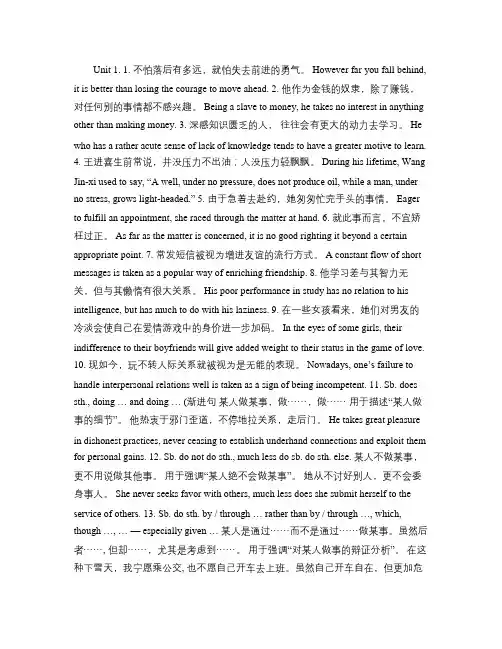
Unit 1. 1. 不怕落后有多远,就怕失去前进的勇气。
However far you fall behind, it is better than losing the courage to move ahead. 2. 他作为金钱的奴隶,除了赚钱,对任何别的事情都不感兴趣。
Being a slave to money, he takes no interest in anything other than making money. 3. 深感知识匮乏的人,往往会有更大的动力去学习。
He who has a rather acute sense of lack of knowledge tends to have a greater motive to learn.4. 王进喜生前常说,井没压力不出油;人没压力轻飘飘。
During his lifetime, Wang Jin-xi used to say, “A well, under no pressure, does not produce oil, while a man, under no stress, grows light-h eaded.”5. 由于急着去赴约,她匆匆忙完手头的事情。
Eager to fulfill an appointment, she raced through the matter at hand.6. 就此事而言,不宜矫枉过正。
As far as the matter is concerned, it is no good righting it beyond a certain appropriate point.7. 常发短信被视为增进友谊的流行方式。
A constant flow of short messages is taken as a popular way of enriching friendship.8. 他学习差与其智力无关,但与其懒惰有很大关系。
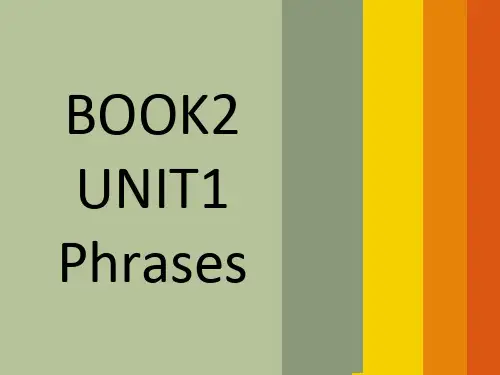
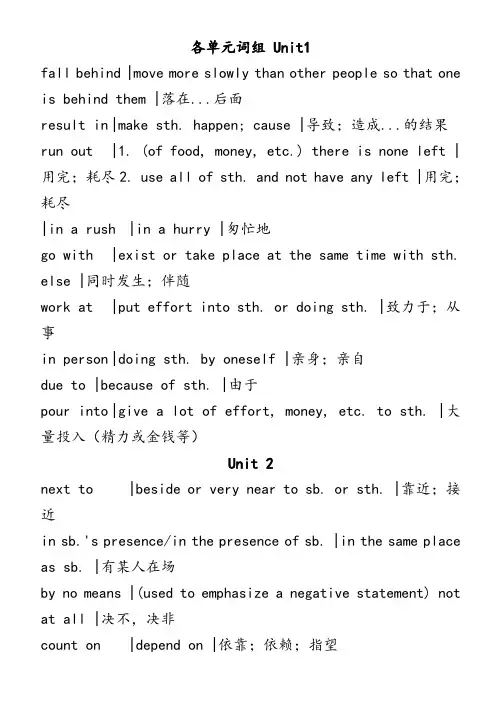
各单元词组Unit1fall behind |move more slowly than other people so that one is behind them |落在...后面result in |make sth. happen; cause |导致;造成...的结果run out |1. (of food, money, etc.) there is none left |用完;耗尽2. use all of sth. and not have any left |用完;耗尽|in a rush |in a hurry |匆忙地go with |exist or take place at the same time with sth. else |同时发生;伴随work at |put effort into sth. or doing sth. |致力于;从事in person |doing sth. by oneself |亲身;亲自due to |because of sth. |由于pour into |give a lot of effort, money, etc. to sth. |大量投入(精力或金钱等)Unit 2next to |beside or very near to sb. or sth. |靠近;接近in sb.'s presence/in the presence of sb. |in the same place as sb. |有某人在场by no means |(used to emphasize a negative statement) not at all |决不,决非count on |depend on |依靠;依赖;指望on one occasion |once |有一次come upon |meet sb. or find sth. by chance |偶然遇见;偶然发现pack into |put in a very small place |塞进;使挤入take notice of |notice |注意到sing out |shout or sing some words clearly and loudly |(大声清晰地) 喊出(或唱出)point out |tell sb. sth. |指出reflect on |think deeply about; consider carefully |仔细考虑in advance |doing something before a particular date or event |事先,预先Unit 4Phrases and Expressionswithout fail |with complete certainty |必定;总是as long as |if; on condition that |假如,如果,只要be free to do sth. |be able to do whatever one wants |随意做某事right away |at once; without delay |立即,马上more than (+adjective) | (colloq.) very; extremely |十分,非常be thankful for | be grateful for |对...心存感激Unit6fill out |write necessary information on an official document, form, etc. |填写if only |used for saying that sth. is good only for a limited purpose or time |就算...都行;哪怕...也好for better or (for) worse |whether the result is good or bad |无论好坏;不管怎样even so |in spite of this |即使如此;尽管这样turn down |refuse to accept an offer or request |拒绝come up to |move toward sb. |走近,靠近press for |try in a determined way to get sth. |催促;竭力争取ill at ease |uncomfortable; not relaxed |不自在free from |not containing or involving sth. unpleasant |无...的;不涉及...的take charge of |take control and become responsible for sb. or sth. |负责;管理be stuck with |be forced to have or use sth. |被迫拥有或使用Unit 7among other things |used when one is mentioning one or more things out of a large number |除了其他事情之外blow one's top |become very angry suddenly |勃然大怒;大发雷霆on one's trail |on one's way |在...路上cut down |reduce the amount of sth. |减少...的数量keep in mind |remember sth. |记住Unit 8be wasted on sb. |not understand sth. or not realize how valuable sth. is |被浪费在某人身上if only |used to express a strong wish, esp. when one knows that what they want cannot happen |但愿;要是...就好了well off |rich or having enough money to live well |富裕的at a low |at a low level or degree |处于低水平be meant to do sth. |should do sth. or have a responsibility to do sth. |应该做某事read of |get information from books, newspapers, etc. |读到;从...得知only to do sth. |used for saying that what happens next is disappointing or unpleasant |不料;反而;结果却in the long run |not immediately but at a time in the future |从长远来看send in |arrange for sb. to go to a place |派(人)去。
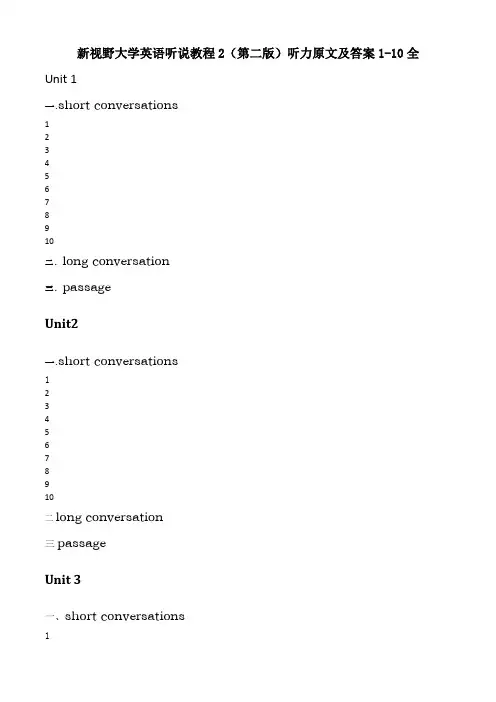
新视野大学英语听说教程2(第二版)听力原文及答案1-10全Unit 1一.short conversations12345678910二.long conversation三.passageUnit2一.short conversations12345678910二long conversation三passageUnit 3一、short conversations12345678 910二long conversation三passageUnit 4一.short conversations 12345678910二long conversation三passageUnit 5一short conversations1235678910二long conversation三passageUnit 6一.short conversations 1234567810二long conversation三passageUnit 7一.short conversations 12345678910二long conversation三passageUnit 8一.short conversations 12345678910二long conversation三passageUnit 9一.short conversations二long conversation三passageUnit 10一.short conversations二long conversation三passage新视野大学英语听说教程【第二版】第二册答案Unit 1 International Clock TalkShort Conversations1.B2.D3.C4.D5.C6.C7.B8.B9.A 10.CLong Conversation1.D2.D3.A4.B5.CUnderstanding a Passage1.C2.D3.B4.C5.BMovie Speech1.upset2.sickw4.harmless5.break6.replaced7.memories8.natural9.birthday 10.appreciateStory-retelling1. Sit quietly and listen to him2. A blank stare3. Put it a different way4. speak up in class5. In turn/ a great deal ofHomework ListeningTask 1 1.D 2.C 3.B 4.D 5.BTask 2 1.C 2.A 3.B 4.A 5.CTask 31.the age, size and future2.seventy years ago3.increase with distancete that month5.a light year6.distances in space7.other measurements 8.support the idea9.slow down and break up 10.or possibly even olderUnit 2 All that Glitters Is Olympic GoldShort Conversations1.B2.B3.C4.C5.C6.A7.A8.A9.C 10.ALong Conversation1.D2.B3.C4.D5.DUnderstanding a Passage1.C2.B3.C4.D5.DMovie Speech1.training2.touch3.understand4.appreciate5.trouble6.fighting7.three8.honest9.cry 10.borrow Homework ListeningTask 1 1.D 2.C 3.D 4.B 5.ATask 2 1.A 2.B 3.C 4.B 5.DTask 31.on the ball2.did something unexpected3.at the job or activity4.hit it out of the park5.think it over6.is very successfulplete a job or activity 8.did something wrong9.how much it is worth 10.close to my selling priceUnit 3 Pros and Cons of mixed MarriagesShort Conversations1.D2.A3.B4.C5.D6.A7.D8.B9. A 10.BLong Conversation1.A2.B3.D4.D5.AUnderstanding a Passage1.B2.D3.D4.A5.BMovie Dialog1.night2.definitely3.love4.wise5.My wife6.267.died8.youngest9.goes by 10.gotten oldListening and Speaking1.physically OK2.To the kitchen3.a bowl of ice cream4.I don’t need to write it down5. a plate of bacon and eggsSupplementary ListeningTask 1 1.A 2.B 3.D 4.C 5.DTask 2 1.B 2.D 3.B 4.C 5.ATask 31.they care about2.performed marriages .3.wait longer to get married4.bring people together5.plan a blind date6.follow their cultural traditions7.meant for the other 8.establishing a relationship9.improve their chances 10.meet someone over the InternetUnit 4 A Hunk of Burning LoveShort Conversations1.D2.B3.C4.A5.B6.D7.A8.C9.C 10.BLong Conversation1.B2.A3.C4.D5.BUnderstanding a Passage1.C2.B3.D4.B5.AMovie Speech1.certain2.occasionallye along4.receiving5.delight6.gathering7.natural8.special9.welcoming 10.remindingHomework ListeningTask 1 1.A 2.C 3.A 4.B 5.BTask 2 1.D 2.C 3.A 4.C 5.BTask 31.answer a question2.to be admitted3.copies of all school records4.the results of the TOFEL5.minimum acceptable TOFEL score6.additional English training7.conditionally accept students 8.taking regular class9.provides more information 10.successfully pass classesUnit 5 Enough of worries and tearsShort Conversations1.C2.D3.A4.C5.A6.B7.D8.D9.D 10.CLong Conversation1.B2.D3.A4.D5.AUnderstanding a Passage1.D2.C3.B4.A5.CMovie Speech1.everything the light touches2.rises and falls3.will rise with you4.shadowy place5.never go there6.getting your way7.exists together 8.respect all creatures 9.let me explain10. in the great circle of lifeHomework ListeningTask 1 1.B 2.A 3.D 4.B 5.CTask 2 1.A 2.C 3.D 4.D 5.BTask 31.one million new cases2.have increased3.drug treatments4.gathered results5.145,0006.before it has spread7.from coming back 8.reduce by half 9.within 15 years10.middle-aged womenUnit 6 What’s in a name?Warming up1.T2.F3.TShort conversations1.B2.A3.D4.B5.B6.C7.C8.A9.B 10.CLong conversation1.A2.D3.D4.C5.BPassage1.C2.A3.B4.C5.DMovie dialog1.important decisions2.As in3.agreed on4.What’s wrong with5.I mean6.wait a minute7.what a challenge 8.what he’s doing? 9.gets his way10.ever imaginedHomeworkTask 1 1.B 2.C 3.B 4.C 5.CTask 2 1.B 2.C 3.D 4.B 5.DTask 31.federal governmentcation reform law3.be forced to4.place top importance on5.calls for6.main goal7.by 40 percent 8.low-income and minority9.poorly performing students 10.free after-school helpUnit 7 Relax or DieShort Conversations1.B2.C3.B4.A5.A6.D7.B8.C9. D 10.CLong Conversation1.D2.C3.B4.A5.BUnderstanding a Passage1.C2.C3.D4.D5.BMovie Speech1.flight2.heartbroken3.tries real hard4.witnessing a miraclepletely6.marriage7.special occasions 8.sacrifices 9.dream10.chooseHomework ListeningTask 1 1.D 2.D 3.A 4.C 5.ATask 2 1.D 2.B 3.D 4.A 5.DTask 31.severe mental health2.published the findings3.examined the results4.gathered the information5.learn what treatment6.nervous anxiety7.illegal drugs 8.less likely to admit9.with serious disorders 10.prevent many serious cases laterUnit 8 Life Outside of WorkShort Conversations1.B2.A3.C4.D5.D6.D7.C8.B9. A 10.BLong Conversation1.B2.A3.D4.A5.CUnderstanding a Passage1.B2.C3.C4.A5.BMovie Speech1.the light had gone2.should remember3.don’t go the right way4.when we suffer defeat5.you’re really tested6.on the highest mountain7.served this government and this country 8.always give your best9.high hopes and good spirits 10. in our heartsHomework ListeningTask 1 1.C 2.D 3.D 4.D 5.BTask 2 1.A 2.C 3.B 4.B 5.CTask 31.how much they expect to learn2.dishonest reporting3.are charged with4.under pressure5.include a warning6.should not be held responsible7.have influenced that decision 8.no reason to stop9.estimate earnings 10.to hide bad newsUnit 9 Only Losers QuitShort Conversations1C 2.D 3.A 4.A 5.D 6.B 7.A 8.B 9.C 10.CLong Conversation1.B2.D3.A4.C5.CUnderstanding a Passage1.B2.D3.C4.C5.BMovie Speeche on in2.sweetheart3.a part of life4.your own destiny5.God gave you6.figure that out7.a box of chocolates 8.explaining 9.had got the cancer10.with little flowers on itHomework ListeningTask 1 1.A 2.C 3.D 4.B 5.BTask 2 1.C 2.A 3.B 4.C 5.ATask 31.develop a plan2.reduce cancer rates3.cancer prevention and control4.a leading cause of death5.on the rise6.cancer-producing chemicals7.aging populations 8.most common forms,9.more action is needed 10.early cancer testingUnit 10 The Tragedy of WarWarming up1.F2.F3.TShort Conversations1.D2.B3.B4.D5.C6.C7.A8.B9.C 10.ALong Conversation1.D2.C3.A4.B5.DUnderstanding a Passage1.B2.C3.D4.D5.AMovie Speech1.guarded2.a greater responsibility3.Marines4.probably saved lives5.existence6.parties7. honor 8.spent defending something 9.freedom10.OtherwaiseListening and Discussion1. A Japanese pen friend.2. He had always criticized the nuclear attacks.3. Around 140,000 people.4. Open-ended.5. Open-ended.Homework ListeningTask 1 1.D 2.D 3.C 4.A 5.BTask 2 1.C 2.B 3.D 4.B 5.ATask 31.monthly payments2.more money than3.is expected to4.be out of money5.born out of6.pay for itself7.start with 8.survived the death 9.for the poor 10.all federal workers。

新视野大学英语2短语(共10页) -本页仅作为预览文档封面,使用时请删除本页-Unit 1(A)fall behind 落在…后面result in 导致;造成…的结果run out 用完;耗尽in a rush 匆忙地go with 同时发生;伴随work at 致力于;从事in person 亲身;亲自due to 由于pour into 大量投入(精力或金钱等)Unit 1(B)adjust to 适应familiar to 为…所熟悉culture shock 文化冲击;文化震撼tired of (doing) sth 厌烦(做)某事separate from 把…分开;分离prevent from 阻止;防止recover from 从(疾病,事故,震惊等)中恢复go through 经历;经受Unit 2(A)next to 靠近;接近in sb’s presencein the presence of sb 有某人在场by no means 绝不,绝非count on 依靠;依赖;指望on one occasion 有一次come upon 偶然遇见;偶然发现pack into 塞进;使挤入take notice of 注意到sing out (大声清晰地)喊出(或唱出)point out 指出reflect on 仔细考虑in advance 事先,预先Unit 2(B)act as 作为above all 最重要的是not hear of it 不听;拒绝听取set one’s mind on 决心做某事(或得到某物)set the stage for 为…做好准备focus on 聚焦于;集中(精力)于be used to(doing)sth 习惯于hold one’s breath 屏住呼吸strip sb of sth 剥夺charge sb with sth 指控;控诉Unit 3(A)ups and downs 盛衰;沉浮work out 成功;产生结果for a time 暂时;一度meet with 遭遇;遇到all along 始终have nothing to do with 与…无关on the surface 表面上;外表上at one’s worst 最差的时候;最糟糕的时候learn of 获悉;听说Take care of 负责;处理procceed to do sth 接着做某事Unit 3(B)come up with 想出,提出(答案,解决办法)win over 说服;把…争取过来from head to toe 浑身上下on the short/fat/thin,etc 有点矮(胖,瘦等) think of 有…的看法put (sb) to bed 安置(某人)睡觉hit it off 相处得很好;一见如故Unit 4(A)without fail 必定;总是as long as 假如,如果,只要be free to 随意做某事right away 立即,马上more than(+adjective) 十分,非常be thankful for 对…心存感激Unit 4(B)from day to day 天天from hour to hour 不停地,一直地on occasion 有时,偶尔take its toll on 损害;破坏cling to 坚持,忠于lose control 失去控制be/become accustomed to doing 习惯于(做)某事a far cry from 与…相距很远与…大相径庭have sth in common 有共同之处on earth 到底,究竟Unit 5(A)pick up 拿起,举起be grateful for 感激;为…致谢be dressed in 穿着coupled with 加上die from 死于direct at 对准,针对starve sb of sth 使缺乏,使得不到Unit 5(B)make a point 提出论点take…for granted 视…为理所当然hold down 保住(工作)pine for 为(不能得到某物)而伤心make fun of 嘲笑,取笑stand up to 经得起,经得住give in 屈服,让步to some degree 在某种程度上on demand 一经要求turn over a new leaf 悔过自新,洗心革面in the end 最后,终于Unit 6(A)fill out 填写if only 就算…都行,哪怕…也好even so 即使如此,尽管这样turn down 拒绝come up to 走进,靠近press for 催促,竭尽全力ill at ease 不自在free from 无…的,不涉及…的take charge of 负责,管理be stuck with 被迫拥有或使用Unit 6(B)go to great lengths 竭尽全力做某事take sides 支持某人,偏袒一方act out 将(思想或情感)表达出来speak of 表明,意味着turn off 使离开turn out 不理会,不理睬up to 能适合的,能胜任的more or less 几乎,差不多follow one’s track 跟着,跟踪apart from 除了,除…之外blow one’s cover 揭露,揭某人老底out of character 与某人个性不符out of bounds 禁止进入的Unit 7(A)among other things 除了其他事情之外blow one’s top 勃然大怒,大发雷霆on one’s trail 在…的路上cut down 减少…的数量keep in mind 记住Unit 7(B)other than 除了…之外(还)on the other hand 另一方面to the contrary 相反的burn the midnight oil (学习,工作)到深夜rack up 积累,逐步增加fear for 为…担心at work 在工作come in 出现,发生put all one’s eggs in one basket 孤注一掷Unit 8(A)be wasted on sth 被浪费在某人身上if only 但愿,要是…就好了well off 富裕的at a low 处于低水平be meat to do sth 应该做某事read of 读到;从…得知only to 不料,反而,结果却in the long run 从长远来看send in 派(人)去Unit 8(B)the good old days 过去的好时光play(it)safe 稳扎稳打,小心行事whether…or not 无论,不管be happy with 对…感到满足认为…是好的in short 总之,简而言之by comparison 相比之下associate with 把…联系在一起,与…相关联at large 全部,整个in the absence of 由于缺乏protect…from…防御,保护graind to a halt 逐渐停止Unit 9(A)In (the) face of 面对make sth of sb 使成为有出息的人pass away 死亡,逝世have sth at heart 关心from sb’s standpoint 从某人的立场或观点来看be entitled to 有权做,有权得到pick up the pieces 收拾残局,恢复正常take shelter 躲避lap up 欣赏look forward to 期待,期望know better 有头脑,明事理watch out 注意,小心once and for all 一劳永逸地,永远的out of tough with 不再了解Unit 9(B)prefer…to…更喜爱,宁可apply for 申请pay off 获益,得到回报in the meantime 与此同时,在此期间with reference to 关于due to 因为,由于look at 考虑,思考be obliged to 有责任或义务做某事fill up 填满,装满take offense (at sth) (对某事)生气; (因某事而)见怪Unit 10(A)drive off 击退,赶走be sure of 一定会,肯定会in broad daylight 光天化日之下carry on 继续做under control 处于控制之下on the air (广播或电视)播出keep sb from doing 阻止某人做某事watch for 留意,密切注意put out 扑灭,熄灭mark down 记下来,写下来provide for 为…做准备Unit 10(B)break off (使)折断,中止sink into 恶化,陷入更糟糕状态wanting in sth 某物不足,缺少某物expect sth of sb 对某人有期望,指望某人做remain of 从…留下,剩下make for 朝…走去;朝…前进take sb in 收留,收容be seized with 被(强烈的感情)影响或支配go into 陷入。
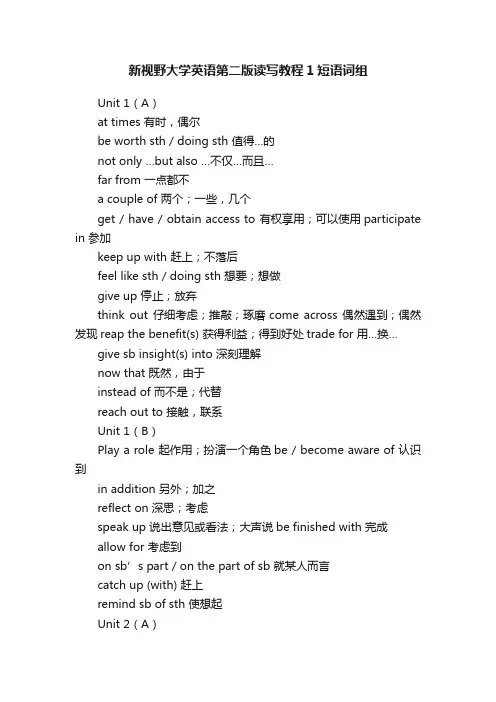
新视野大学英语第二版读写教程1短语词组Unit 1(A)at times 有时,偶尔be worth sth / doing sth 值得…的not only …but also …不仅…而且…far from 一点都不a couple of 两个;一些,几个get / have / obtain access to 有权享用;可以使用participate in 参加keep up with 赶上;不落后feel like sth / doing sth 想要;想做give up 停止;放弃think out 仔细考虑;推敲;琢磨come across 偶然遇到;偶然发现reap the benefit(s) 获得利益;得到好处trade for 用…换…give sb insight(s) into 深刻理解now that 既然,由于instead of 而不是;代替reach out to 接触,联系Unit 1(B)Play a role 起作用;扮演一个角色be / become aware of 认识到in addition 另外;加之reflect on 深思;考虑speak up 说出意见或看法;大声说be finished with 完成allow for 考虑到on sb’s part / on the part of sb 就某人而言catch up (with) 赶上remind sb of sth 使想起Unit 2(A)along with 一起turn off 关闭burst into 闯入;突然开始over and over 一再;反复reach for 伸手去摸turn up 调大turn down 调小as usual 通常in peace and quiet 平静地wake up (使)醒来make one’s blood boil 使某人生气get rid of 除去;扔掉knots in one’s stomach 紧张;不安in any case 无论如何;不管怎样talk sth over 商议;讨论Unit 2(B)as a result 因此in turn 因此,转而;依次,轮流tap into 了解get ahead 取得进步;成功look to 依赖;指望feel like 感觉好像;似乎the way 以…方式sound like 听起来;似乎rather than 而不是point of view 观点;意见as opposed to 与…对照;而不是get across (被)理解;(被)接受be concerned about 担心check in 电话报平安;登记手续put sth away 把某物收好或放好lose one’s cool 失去冷静awaken sb to sth 是某人意识到某事Unit 3(A)Lean on 依靠grow up 成长;长大let on 泄露;透漏start out 出发make it 及时赶到;办到,做到even if / though 即使,虽然on one’s way(to)在路上break out 突然发生,爆发on leave 休假see(to it)that 务必做到Unit 3(B)come to 苏醒,恢复知觉now and again / then 不时地,有时候call for 要求set out 出发for a while 一会儿,一段时间pay attention to 关注,注意hold to 握住,抓住;坚信,忠于with that 接着,随即turn out 结果是,证明是Unit 4(A)make up one’s mind 下定决心,打定主意range from…to…(在一定范围内)从…到…变化,变动be committed to 献身于,投入于be absorbed in 全神贯注于,专心于fix one’s eyes on 凝视,盯住看drive sb crazy 逼得某人发疯at one’s best 处于最佳状态lighten up 放轻松;别太当真take sb / sth seriously 认为某人或某物重要Unit 4(B)the minute 一…就…find out 找出,查明,发现in relation to 有关,关于become acquainted with 与…相识,了解pick up 学会,得到in part 在某种程度上,部分地be / feel at home 感觉无拘束be content with 对…感到满足a wealth of 大量的,丰富的after all 终究,最终还是毕竟Unit 5(A)be infected with 感染(疾病)in place of 代替suffer from 遭受…,患(某种疾病)hand out 分发,散发set up 建立,创立(公司,构等)at risk 有危险,有风险regardless of 不管,不顾guard against 防止…发生wipe out 彻底摧毁;消灭district sb from sth 使分心sign up for 报名参加Unit 5(B)In haste 匆忙地call sb names 骂某人have a shot at sth 尝试,企图,努力做某事take first place 获得第一名for fear (that) 担心,生怕start with 从…开始Unit 6(A)head to 去,去往make the rounds 逐一巡查、访问go with 与…相配look sb in the eye(s)坦然正视某人at the sound of 一听到nothing but 只是be /feel ashamed of 为…感到羞耻;为…感到惭愧Boast about /of 吃嘘stay away from 避开stay at 停留在contrary to 与…相反look down on/upon 蔑视;看不起be in for 将遭遇hold water 经得起考验;可靠leave behind 忘记带;留下Unit 6(B)die of 死于care for 看护,照顾;喜欢stay up 熬夜straighten out 解决(问题);理清(混乱情况)and all that 等等,诸如此类pick out 认出ask around 到处打听Unit 7(A)face to face (with) 面地面的/地面临着;面对着pull into (车)停靠,驶向一旁as if 好像attach…to…系在…上,连接到...上Have mercy on sb 对某人仁慈get to one’s feet 站起来look through 浏览,查找out of control 失去控制eat (away) at 侵蚀;消耗Unit 7(B)be immune to 不受…影响的,对…有免疫力的believe in 相信…的存在;信任be capable of 有能力(做)be intended for 打算供…之用;为…而准备hear of 听说,得知at the sight of 一看见live with 忍受,容忍Unit 8(A)sleep on sth 暂时不作决定过一晚再作决定a gift from the gods 天赐,走运的机会depend on 依靠,依赖write down 写下来be occupied with 忙于做,专心于seek for 寻找as though 好像take shape 成形put into (以…方式)表达at work 在起作用arrive at 达成(协议),得出(结论)search for 搜索,寻找fill sb with sth 使充满(感情)Unit 8(B)right away 立刻act on/upon 依照…行动come one’s way 发生在某人身上;可以被某人利用fall asleep 睡着take advantage of 利用;(不公正地)利用某人bring sb together 使聚在一起;使联合lead to 引发,导致at once 同时set (sth) in motion 使…运转起来;启动back and forth 来回,前后take up 开始从事;对…产生兴趣Unit 9(A)stand out 突出;出色no matter how/where/what/ 不管怎样…turn in 上交with ease 容易地,不费力的sit back 闲坐着;不作努力get behind 拖延get sth out of the way 完成或处理某事strike sb as sth 给某人某种感觉或印象have to do with 与…有关plow through 艰难地完成adapt to (使)适应Unit 9(B)catch phrase 流行语;口头禅drop out 中途退出;辍学figure out 想出,理解,明白would rather…than…宁愿…不愿care about 关心as to 关于,至于page through 翻看;浏览end up 以…结束;最终达到as long as 只要do with 利用,处置Unit 10(A)middle ground 中间道路,折中sell out(to) 出卖(原则或信念等)at hand 在考虑中即将到来,尽在手边in short supply 缺货,短缺the bottom line 重要因素,关键的东西demand of 期待,要求stand for 主张,支持,代表,象征confront with 面对,对质think of 考虑,为…设想想起,回忆起do fine 干的好give sb credit 赞扬in other words 换言之win the day 获胜,成功Unit 10(B)for free 免费hand over 递交do the trick 达到目的hail as 称赞为a little bit 有点be inclined to 倾向于,容易(做)sort of 有几分;近似be a question of sth (重要的)是…的问题make the most of sth 充分利用某物。
新视野大学英语(第二版)读写教程第二册1-10单元汉译英+英译汉Unit 1 汉译英1.她连水都不愿喝一口,更别提留下来吃饭了。
(much less)She wouldn't take a drink, much less would she stay for dinner.2.他认为我在对他说谎,但实际上我讲的是实话。
(whereas)He thought I was lying to him, whereas I was telling the truth.3.这个星期你每天都迟到,对此你怎么解释?(account for)How do you account for the fact that you have been late every day this week?4.他们利润增长的部分原因是采用了新的市场策略。
(due to)The increase in their profits is due partly to their new market strategy.5.这样的措施很可能会带来工作效率的提高。
(result in)Such measures are likely to result in the improvement of work efficiency.6.我们已经在这个项目上投入了大量的时间和精力,所以我们只能继续。
(pour into)We have already poured a lot of time and energy into the project, so we have to carry on.英译汉1. I don’t think that he would commit robbery, much less wouldhe commit violent robbery.我认为他不会抢劫,更不用说暴力抢劫了。
2. Men earn ten dollars an hour on average, whereas women onlyseven dollars.男工帄均工资每小时10美元,而女工才每小时7美元。
Unit 1 sectio nAdrop in 顺便拜访drop in at sb 顺便拜访某人drop in on sp 顺便拜访某地standstill停滞不前fell behind sb/sth 落后于to fall behind others落后于某人to fall behind sb in sth 在某方面落后与某人fall behind with sth 在某方面滞后,拖欠result=cause=lead to=bringabout导致nothin g but=onlyaccoun t to sb for sth 向某人解释某事on accoun t of 由于on no accoun t 绝不take accoun t of=take……into accoun t 考虑到countin 把……算入counton/upon=rely on 指望countout 逐一数出countup总计△Once the stands have run out of a person’s hourgl a ss,they canont be replac ed.时光一去不复返in a rush匆匆忙忙underpressu re 处于压力之下undersuspic ion 收到怀疑race through=do sth very fastget back to 恢复,返回到within the time allowe d在时间允许范围内take it person ally认为某事是针对自己的beyond point过分的,不得当的much less=stillless=let alone=not to mentio n 更不用说sb does not do sth,much less does sb. do sth else. 某人不做某事,更不用说做某事。
第一单元1 budget n. 预算 ; v. 编预算 , 为…做预算2 charge |v. |向 ... 收费,要价3 acute a. 敏锐的 , 敏感的,严重的5 restless a. 不安静的 , 焦虑的7 elbow n. 肘 , 扶手 ; v. 用手肘推开 , 推挤8 abrupt a. 突然的 , 粗鲁的10 opening n. 开始 , 开业典礼 , 空缺职务 ; 开始的11 ritual n. 惯常的惯例仪式 , 典礼 , , 12 interaction n. 交流相互作用 , 相互影响13 convention n. 大会 , 惯例 ; 习俗14 leisure n. 空闲 , 闲暇16 assess v. 估定 , 评定17 surroundings n. 周围的事物 , 环境 20 probe n. 探针 , 调查 ,20 social a. 社会的社交的21socially ad. 与社会 (或社交相关地 21 tick n. 滴答声 , 滴答响22 consequently ad. 所以 , 因此25 device n. 装置 , 器械,方法,手段 26 fax n. 传真 ; v. 传真27 email n. 电子邮件(electronic mail 的缩略24given 如果考虑到28 electronic a. 电子的 ; n. [-s]电子学 , 电子设备29 significance n. 意义 , 重要性30 conduct n. 行为 , 举动 , 品行 ; vt. 引导 , 指挥 , 管理 ; vt. 导电,传热25gathering 集会,聚会26 impersonality不牵涉个人感情; 无人情味 27 electronic 使用电子设备的电子的 28 significance |n要性;重要意义29 conduct 进行;实施传导(电或热行为,举止31 increasingly ad. 日益;愈加34 obtain vt. 获得 , 得到 ;35 superb a. 极好的36 whereas conj.&ad. 然而 , 但是30 postal 邮政的;邮寄的31 efficient效率高的 |无礼的,失礼的 37 elapse v. (时间逝去 , 过去 38 skillful a. 熟练的有技巧的40 competent a. 有能力的 , 胜任的 ,41 fulfill v. 完成 , 履行 ; vt. 履行41 capital 资本;资金unit01_newwords_b.spite 虽然;尽管clash |vi. 不一致;冲突 n. 争论 tradition |n.传统honeymoon |n. 蜜月期; (喻短暂的和谐期marvelous |a. 非常好的;绝妙的 amusement 愉快,快乐娱乐(消遣活动hostility |n.敌意;敌对moreover |ad. 此外;而且distress |vt. 使痛苦;使苦恼 n. 痛苦, 苦恼devise |vt.设计;发明mechanism |n.行为方式;机制cope |vi.应付;处理repression |n.对情感或欲望的压抑;抑制镇压acceptable |a.可接受的;合意的isolate |vt. 使孤立;使隔离isolation |n.隔离;孤立reject |vt.拒绝;不接受抛弃,丢弃 utilize |vt.使用deal |vi.对付;应付;处理hostile |a.怀有敌意的,敌对的敌方的, 好战的recognition |n.承认;认可temporary |a.暂时的recovery |n. 恢复;痊愈重获;复得 favorable |a.有利的赞成的symptom |n. |迹象;征兆症状 distinction |n.特点; 特征区别; 差别卓越; 杰出appreciate |vt.欣赏;赏识对 ... 表示感谢 acquisition |n.获得,得到alleviate |vt.减轻,缓和interact |vi.交流互相作用;互相影响 considerable |a.相当大的;相当多的furthermore |ad.此外;而且unit02_newwords_apat |vt.轻拍presence |n.在场;出席promising |a. 有前途的;有希望的 amateur |a.业余的 n. 业余爱好者 session |n.(从事某项活动的一段时间, 会议amusing |a.有趣的lower |vt.减少;降低,降下 anniversary |n.周年纪念日woolen |a.羊毛的romantic |a. 浪漫的gratitude |n.感激;谢意ski |vi. 滑雪massive |a.大的;严重的fatigue |vt.使疲劳 n. 疲乏,疲劳clearing |n.(林中空地 approximately |ad.大约,大概breeze |n. 微风,和风powder |n. 粉末;粉状物fuss |v.n (因小事抱怨;小题大做 indifferent |a.漠不关心的;冷漠的rebel |vi.造反; 反叛; 反抗 n. 造反者, 反叛者,反抗者bachelor |n.未婚男子,学士(学位 shift |v. 转移;移动;变换 makeshift |a. 权宜的;暂时的stack |vt. 堆放sticky |a.黏的;黏性的mate |n. 伙伴,同伴assert |vt.断言;声称napkin |n. 餐巾(纸swear 咒骂 vt. 发誓damn |a. | |该死的;讨厌的unfair |a.不公平的;不公正的 passion |n. 激情;热情persist |v. 坚持 vi. 继续存在或发生 frown |vi.皱眉billion |num. 十亿rank |vi.位于 ... 等级(或地位 vt. 排列 n. 职位;社会地位indissoluble |a坚不可摧的bond |n. 联系;纽带tropical |a. 热带的 Phrases and Expressionsnext to 靠近;接近in sb.'s presence/in the presence of sb.有某人在场by no means决不,决非count on依靠;依赖;指望on one occasion有一次come upon偶然遇见;偶然发现pack into塞进;使挤入take notice of注意到sing out (大声清晰地喊出 (或唱出 point out指出reflect on 仔细考虑in advance事先,预先unit02_newwords_bcompetition |n.竞争sake |n. 为了 ... 目的,为了 ... 好处 athlete |n. 运动员sacrifice |vt.牺牲;奉献injury |n. 伤害;损害exploit |vt.利用;剥削glory |n.光荣;荣誉virtue |n. 美德determination |n.决心;毅力dash |n.短距离赛跑,奔;冲 competitive |a.喜欢竞争的;好胜的 ,竞争的;有竞争力的defy |vt.向 ... 挑战 ,违抗;不服从 stopwatch |n. 秒表pursue |vt.从事;追求追逐strip |n. 条 ;带 vt. 剥去;除去singular |a.卓越的;非凡的单数的 phenomenon |n.奇才;奇迹,现象 horizon |n. |范围;眼界;视野,地平线 observer |n. 观看者crack |n.爆裂声;劈啪声 v. (使发出爆裂声, (使破裂trail |vi. 拖沓地走;无精打采地慢走, vt. 跟踪;尾随explosive |a. 迅猛的, 易爆炸的; 易发作的 n 爆炸物overcome |vt.战胜;击败committee |n.委员会indicate |vt.表明 ; 显示conquest |n.攻占 ; 占领;征服condemn |vt.谴责condemnation |n.谴责opponent |n.对手;敌手deny |vt.否认,拒绝(给予counter |v.反驳rumor |n. 谣言,传闻formula |n.方法;方案 ,公式;方程式 suspicion |n.猜疑;不信任 . 怀疑;疑心 erosion |n. 侵蚀;腐蚀participation |n. 参与,参加relay |n. 接力赛reception |n. 接待;欢迎,招待会;欢迎会 amazing |a. 令人惊异的unit03_newwords_acharacter |n. 性格,个性,特点,特征 compromise |n.v妥协;折中involved |a. 参与的;有关的subtle |a. 微妙的,细微的hatred |n. 痛恨,憎恨illusion |n. 幻觉;错觉married |a. 已婚的mutual |a. 相互的,共同的;共有的 compatible |a. 合得来的; 情投意合的, 兼容的;配套的incompatible |a. 合不来的;不兼容的 overlook |vt.没注意到;忽略,俯视;眺望expectation |n.期待;预料painful |a.痛苦的divorce |n. v.离婚bud |vi. 发芽,萌芽 n. 芽;花蕾resistance |n.抵制;反对,抵抗;对抗 supportive |a. 支持的;支援的grand |a.表示“ (亲戚关系隔一代的” , 壮丽的;宏伟的grandchild </em> |n.(外孙; (外孙女 congratulation |n. 祝贺;道喜counsel |vt.劝告;忠告date |vt.与 ... 约会subsequent |a.后来的;随后的harbor vt. 心怀;怀有 n. 港,港口 reservation |n. 存疑;保留,预订 prejudice |n.偏见;成见charm |vt.迷人;使陶醉 n. 魅力;吸引力 caring |a.体贴的 indication 迹象confirm |vt. 证实;证明;确定,确认 citizenship |n.公民身份;公民权利 suspect |vt.怀疑 n. 嫌疑犯harsh |a.严厉的;苛刻的,刺耳的 hesitate |vi. 犹豫;踌躇;迟疑cancel |vt.取消proceed |vi.继续进行quote |v.引用; 引述 n. 引语,引文 hardship |n.艰难;困苦realistic |a.实际的;现实的resolve |vt.解决;解除, |决定;决心 unit03_newwords_bbrilliant |a. 出色的;聪颖的,明亮的;光亮的arrange |v. 准备;安排 vt. 排列;布置 eve |n. 前夕;前一天cube |vt.切成方块 n. 立方体garlic |n. 蒜,大蒜slice |vt. 切成薄片 n. 片ingredient |n.(食品的成分,配料,因素;要素chop |vt. 切;剁碎purple |a. 紫色的, |紫色concerning |prep.关于toe |n. 脚趾anticipate |vt. 预料;预计criticism |n. |[C, U]批评;指责curl |n. 卷发;卷曲物splash |n. 有色斑点freckle |n. 雀斑;斑点compact 结实的,紧凑的bubble |vi. 冒泡, n 气泡;泡沫bump |n.肿块;突起 , v 碰撞;猛撞 compel |vt.强迫,迫使behalf |n.代表某人;代替某人innocent |a. 无恶意的, 无罪的; 无辜的 dialect |n. 方言,土语pox |n. |[U] |痘,痘疮criticize |vt.批评;批判,评论clue |n. 线索;提示cue |n. 暗示;信号proclaim |vt.宣布;声称diplomatic |a.有交际手段的;圆滑的,外交的soy |n. |大豆sauce |n. 调味汁,佐料china |n. |瓷器somehow |ad.以某种方法;不知怎么的, 由于某种未知的原因miserable |a.痛苦的;悲惨的modest |a.谦虚的,虚心的,适中的,适度的A-OK |ad. 极好;棒极了unit04_newwords_adigital |a. 数字的;数字显示的eyesight |n. 视力volunteer |v. 自愿(做某事 n. 志愿者 identical |a.完全一样的,完全相同的 departure |n. 离开,出发destination |n. 目的地;终点overseas |ad. 在海外; 在国外 a. 海外的; 外国的aboard |prep.&ad.在船(车,飞机等上; 上船(车,飞机等cargo |n.(船,飞机或车辆运送的货物 territory |n.领土;领地deck |n.甲板decrease |n.减少 v. (使减少; (使降低 nourish |vt滋养;给 ... 营养decline |v. 拒绝;谢绝 vi. 减少, n 降低, 下降objection |n.反对;异议forbid |(forbade, forbidden vt.禁止 connection |n. 联系;关系spectacular |a. 壮观的;引人入胜的 fancy |a. 多装饰的;花哨的;别致的 n. 喜爱;迷恋fossil |n.化石patch |n. 小块vanish |vi.消失fog |n. 雾compress |vt. 压缩;压紧cement |n. 水泥warmth |n.温暖resist |vt.忍住;抗拒highway |n. 公路 unit04_newwords_bwhip |n.鞭子chamber |n. 特殊用途的房间security |n.安全;平安rifle |n. |[C] |来复枪;步枪 mechanical |a. 机械的;不动脑筋的 landscape |n. |风景;景色,风景画 kneel |vi. 跪下timber |n. |木材;木料item |n. 条;项;项目gravity |n.引力;重力fairy |n. |[C]小仙子;小精灵toll |n.伤亡人数,通行费stain |v.染污;沾污 n. 污迹;污斑crystal |n. |[C, U]水晶product |n. |[C]产品;制品magnetic |a. 磁的;磁性的,有魅力的; 吸引人的trace |n.微量;少量, [C]踪迹,痕迹 precision |n. 精确,准确descend |v. 下降,下落accustomed |a习惯了的diet |n.日常饮食scenery |n.景色,风景prosperity |n.繁荣;富裕aluminum |n. 铝installation |n. 安装recycle |v.回收利用insurance |n. 保险reluctant |a.不情愿的;勉强的exile |vt. n. 放逐,流放specify |v.明确说明;指明tedious |a.冗长的;乏味的embrace |v. n. 拥抱 vt. 包括,涉及 unit05_newwords_aweep |vi. 哭泣calculator |n.计算器geometry |n. |[U] |几何 (学package |n. 一盒 , 包裹 vt. 包装;打包;捆扎 filter |vt.过滤 n. |[C] |过滤器grateful |a.感激的,感谢的harden |v. (使变得坚强; (使变得冷漠 , (使变硬; (使硬化brand |n.品牌;商标manufacturer |n.制造者,制造商cane |n. 手杖hook |vt.吸引,迷住 n. 钩子;钩状物 noticeable |a.显而易见的;明显的 pneumonia |n. |[U] |肺炎reunion |n. |[C]团聚;重聚slim |a. 苗条的;纤细的 , 微小的;渺茫的 advertisement |n.广告drag |vi.抽烟 vt. 拖;用力拉starve |vt. (使缺乏; (使得不到 v. (使挨饿; (使饿死weaken |v.(使变弱poisonous |a.有毒的swallow |vt.吞;咽 , 轻信;轻易接受bunch |n.串;束;把 , 群;伙insect |n. |[C] |昆虫pregnant |a.怀孕的,妊娠的poison |vt. 使中毒 n. 毒物;毒药quotation |n. 引语batter |v.击打;猛击shelter |n. 庇护所;避难所 vt. 庇护;保护 zone |n. 地区;地带literally |ad.确实地;真正地unit05_newwords_bspoil |vt. 溺爱; 宠坏 , 损坏; 破坏 vi. (食物变质overnight |ad.在夜间;夜里 , 突然间;一下子 a. 夜间的 , 突然间的assign |vt.给予; 分配, 分派, 指派 (任务 lavatory |n. 厕所;盥洗室kit |n.一套工具closet |n.壁橱barely |ad.勉强地;几乎不tendency |n.趋向,倾向generosity |n.慷慨;大度somewhat |ad.稍微;有些harmful |a.有害的;造成损害的 accommodation |n.和解;调和 , 住所;工作场所compensate |v.补偿;弥补possession |n. (个人财物,财产 , 拥有 infer |vt.推知;推断fluctuate |vi.波动;起伏 generous |a.慷慨的;大方的 resentment |n.愤恨;憎恶variable |a.易变的;多变的 n. 可变因素 loosen |v.(使放松; (使松sour |v.(使变坏; (使恶化 ,(使变酸; (使变馊 a. 酸的;馊的parental |a. 父母的;家长的greedy |a.贪婪的;贪心的 , 贪吃的selfish |a.自私的sensitive |a. 理解别人的 , 敏感的;灵敏的 , 容易生气的;神经过敏的undermine |vt.逐渐削弱;破坏limited |a. 有限的contradiction |n.矛盾;不一致conversely |ad.相反(地limitation |n.限制 , 局限;缺陷submit |v.屈从;服从 vt. 提交;递交;呈送 uncover |vt.揭露;揭开 , 揭开 ... 的盖子respond |vi.反应;回应prompt |a.迅速的;即时的 vt. 促使;推动definite |a.明确的;无疑的 , 一定的;肯定的manner |n.方式;方法bound |a.一定的;几乎肯定的satisfied |a.感到满意的gradual |a.逐步的,逐渐的 improvement |n.改进;改善;提高slip |n.过失;小错;疏忽 vi. 滑倒;失足溜走第六单元elegant a.优雅的;文雅的application n. 申请 , 应用;使用;运用 impulsively ad. without thinking about the possible results of what one is doing 冲动地 substitute vt. 代替;替换 n. 代替者;替代物professional a. 职业的;专业的 n. 专业人员talent n.天才;天赋 ;人才bible n.《圣经》definition n.定义;释义characteristic a. 特有的;典型的 n. 特点, 特征approval n. 赞成;同意批准;认可 reserve n. 克制, 拘谨保留; 储备预定 plainness n.不好看;平常convey vt.传达;表达specific a.特有的;特定的具体的;明确的 latter a. (两者中后者的qualify v.(使有资格;取得资格critic n.评论家;批评家prominent a.重要的;知名的refine vt. 使变得文雅提炼;精炼 attractive a. 动人的;有吸引力的 impressive a. 使人印象深刻的stereotype vt.对 ... 有成见;把 ... 模式化模式化的思想extent n. 程度confess v. 承认供认;招供carpenter n. 木匠,木工physicist n. 物理学家Pope n. 教皇nursery n. 托儿所thoughtful a. 深思的;思考的体贴的;考虑周到的creature n. 生物;人award vt.授予;给予奖金;奖品Dr. abbr. 博士;医生objective a.客观的目标appealing a.吸引人的;悦人的popularity n.受欢迎;流行despair vi.失望;绝望label n. 称号;绰号标签 vt. 把 ... 归类; 描述给 ... 加标签sociology n.社会学★ validate vt. 证实virtually ad.实际上;差不多tidy a.整洁的;整齐的wrinkle v.(使起皱纹; (使起褶皱 n. 皱纹有皱纹的;皱巴巴的pants n. 裤子conceal vt.隐藏;隐瞒clip vt.别在 ... 上;夹住 , 修剪 , 夹子;别针 poverty n.贫穷;贫困mild a.轻微的;不严重的 , 温和的;和善的 emotional a. 情感的; 情绪的 , 引发 (或表现强烈情感的 park v.停放(车辆bargain n.便宜货;廉价品协议;交易 , 讨价还价;谈判charity n. 慈善机构 , 施舍物;救济金 exclusive a. 奢华的;高级的 , 专用的;独享的 , 独家新闻;独家报道wander v.漫游;闲逛second-hand a. 二手的;用过的blend v.(使混合; (使掺和 , 混合;混合物upper a.较高的,上面的scale n. 规模;大小;等级ID n.身份证明;身份证discourage vt.阻止;劝阻 , 使泄气;使灰心 entry n. 进入setting n.环境;背景rib vt.开玩笑;戏弄imitate vt.模仿;效仿 , 仿制;仿造rude a.无礼的;粗鲁的 , 简陋的 accompany vt. 伴随;和 ... 一起发生 , 陪伴;陪同removal n. 消除;清除 , 移动;搬迁grace n. 礼貌;风度symbol n.象征;标志 , 记号;符号inherent a.固有的;与生俱来的dignity n. 端庄;体面 , 尊严★ conspicuous a.显著的;明显的 conspicuously ad.显著地;明显地internal a.内部的 , 国内的;本国的 internalize vt.使内在化superficial a. 肤浅的;浅薄的 , 表面的 prevail vi. 盛行;流行catalogue vt. 把 ... 编入目录undoubtedly ad.确实地;无疑地★ sociologist n. 研究社会学的人; 社会学家 Unit 7 overwhelm vt.使受不了;使不知所措击败spin v.(使旋转title vt. 给 ... 取名 , 名称;题目clinical a.诊所的;临床的react vi. 反应tense a.紧张的tremendous a. 巨大的; 极大的 , 很好的; 非常好的★ cholesterol n. 胆固醇excess a. 过量的;过多的 n. 过量fiber n. 纤维circuit n. 电路pump n. 泵(用泵抽吸attribute vt. (~ to 把 ... 归因于;把 ... 归咎于 exterior n.外部;外表 , 外部的;外表的interior n. 内部 , 内部的destructive a.破坏的perceive vt.理解;认为delegate v.授权;委托委派 ... 为代表 , 代表 cycle n.循环;周期 , 骑自行车emphasis n.强调jam n. 堵塞 , 把 ... 塞入stir vt.使激动;激起 , 搅拌outlet n. 发泄★ physiological a. 生理的;生理学的 recommend vt.建议;劝告 , 推荐financial a. 财政的;金融的independent a.独立的;自立的stimulate vt.刺激;激励;激发temper n.心情;脾气priority n.优先处理的事 , 优先权;重要性 viewpoint n. 观点;看法troublesome a.令人烦恼的;麻烦的 politician n.政治家deadline n.最后期限flee v. 逃跑;逃避;逃脱dimension n.维(长、高、宽等部分;方面constant a.经常的;不断的drunk a.喝醉的consequence n. 结果;影响system n.制度;体制;方法 , 系统;体系 sanction vt.批准;认可employee n.雇员employer n. 雇主loyal a. 忠诚的;忠心的hazard vt.冒 ... 的危险;风险trap vt. 把 ... 困于;使陷入 , 陷阱;圈套 consumption n. 消耗;消费;消耗量;消费量mode n.方式;方法merchant n. 商人rack vt. 痛苦;折磨attain vt. 获得evident a. 明显的;显然的★ bleak a.没希望的;暗淡的;阴郁的 lane n.车道 , 小路;小巷discharge v.(使释放; (使排出 , 释放; 让 ... 离开grief n.悲伤,忧伤 , 令人悲伤的事trait n. 品质;特点▲ equate vt.等同presumably ad.大概;可能denial n. 否认rational a.合理的; 基于理性的理智的, 理性的excessive a.过多的;过度的schedule n.日程表;进度表indispensable a. 必不可少的;不可或缺的 ambition n. 抱负;追求目标 , 雄心;野心durable a. 耐用的;持久的welfare n.幸福;安康psychological a. 心理的summarize v.概述Unit 8formal a.正式的poll n.民意测验;民意调查resident a. 居住(在某地的 , 居民 compute v.计算;算出accordingly ad. 此,所以 , 相应地popular a. 受欢迎的 , 俗的;大众的★ accounting n.会计;会计学humanity n.人文学科 , 人类 , 仁爱;人道 ethnic a. 民族的;种族的enroll v. 登记;注册★ enrollment n.注册(或登记人数 , 登记;注册elementary a. 初级的;小学的 , 基本的; 基础的secondary a. (教育中等的 , 次要的★ specialization n. 专门研究;专修★ maturity n.成熟corporation n.公司agency n. 机构 , 代理机构confine n. 界限;范围 , 把 ... 限制于 occupation n. 工作;职业render vt. 给予;提供 , 使得;使成为 institution n. 机构★ revelation n.泄露;揭示 , 所揭露的事★ deduction n.扣除;扣除额preferable a. 更好的;更合适的 civilization n. 文明incredible a. 难以置信的contribution n.贡献 , 捐助;捐款artistic a. 艺术的;与艺术有关的diverse a.不同的;多样的wisdom n. 智慧;睿智union n.工会;联合会 , 联合;合并 accumulate vt.积累depict vt. 描绘;描述puzzle vt. 使迷惑;使费解 , 难题;谜 distinguish v. 辨别;区分roommate n.室友;住同室的人classical a. 古典的youngster n.年轻人expansion n.扩大;扩张;膨胀scholar n.学者motivate vt.激励;激发prospect n.前程;前途 , 可能性accountant n.会计,会计师domestic a.家的;家庭的 , 国内的;本国的 equality n.平等;同等;均等comparison n. 比较preference n.偏爱; 更喜欢 , 喜爱物, 偏爱物 traditional a. 传统的proportion n.部分 , 比例,比率construct vt. 建造;构筑vision n. 想象;构想;设想 , 视力;视觉 gang n.一伙;一帮swell (swelled, swollen v. 增加 , 增大; 膨胀;肿胀industrial a.工业的periodical n.期刊;杂志 , 周期性的 ariation n.变异;变化的东西forecast n. 预言;预测;预报absence n. 缺乏;没有;缺席plausible a.有道理的;可能正确的gloomy a.无望的; 令人沮丧的 , 昏暗的; 阴暗的implicit a. 暗示的;含蓄的principal a. 重要的;主要的 , 校长;院长 economical a.经济的,节约的economically ad.经济上 , 节约地;节俭地 dominant a.占统治地位的;支配的asset n.财产;资产grind (ground, ground v. 缓慢运转;缓慢移动 , 碾碎;磨成粉末eliminate vt.消除;根除display vt. 显露;表现 , 陈列;展览Unit 9standpoint a. 立场;观点tender a.温柔的;亲切的equivalent n.等同物;对应物 , 相等的; 对等的bamboo n. 竹子torture n.拷打;折磨Christ inter. 天啊 , 基督;耶稣基督utter vt. 说;讲 , 完全的;十足的scatter v.(使分散; (使散开insane a.患精神病的;疯狂的grocer n.食品杂货商;杂货铺店员deceive vt. 欺骗missile n. 导弹ambitious a.雄心勃勃的;充满野心的 identification n.识别;辨认revolve v.(使旋转intermediate a. 中级的;中等程度的 advanced a.高级的,先进的lap vt. 舔食 , (水拍打monstrous a. 残忍的;可怕的refugee n.难民corruption n.腐败fascinate vt.强烈吸引,迷住▲ humiliate vt.使丢脸;使蒙羞 sympathize vi.. 同情;体谅diplomat n. 外交官embassy n.大使馆全体官员;大使馆oval a. 椭圆形的journalist n.新闻记者considering prep. 考虑到★ onward a.&ad.向前的 (地 ; 前进的 (地 correspond vi. 相符;相一致 , 通信marginal a.微小的;少量的 , 边缘的 concession n.承认,认可 , 让步keen a.渴望的;热衷的 , 强烈的 nuisance n.讨厌的人或东西thrill n. 兴奋,激动 , 使激动;使兴奋 fantasy n.幻想depart vi.启程;离开scheme n.计划;规划summit n.顶点;顶峰namely ad.即;也就是overall a. 全面的forevermore ad.永远New Wordsimmigrant n移民disabled a. 残疾的supervise v.监督;指导hearing n. 听力evidently ad. 明显地ownership n. 所有权;拥有loan n.贷款software n.(计算机软件silicon n.硅integrate vt. 使合并;使结合 microcomputer n.微型计算机Inc. abbr. (公司的股份有限的 gamble n.打赌;赌博meantime n. 其间;同时honorable a. 可敬的;高尚的undertake vt.承担;许诺sponsor vt. 赞助;资助 , 赞助者★ affordable a.平价的;廉价的rarely ad. 很少scope n.范围★ non-profit a.(组织非营利性的 regarding prep.关于disability n.缺陷;残疾present vt. 展示;呈现;提交 , 出席的;在场的characterize vt. 描述 ... 的特征bulk n.大部分;多半reference n.提及;谈到 , 参考;查阅 productivity n.生产率;生产力quantity n. 量;数量applicant n.申请人 skilled a.有技术的;熟练的oblige vt. 强迫;迫使equation n.方程式;等式 , 等同;相等 simplify vt. 简化abnormal a.反常的guarantee vt.确保,保证relevant a.有关的;相关的margin a.富余;余地 , 页边的空白 abundant a.大量的;充裕的offense n.冒犯;得罪过错assumption n. 假设;假定unemployment n. 失业 , 失业人数exclude vt.不包括;排除deserve vt. 应得;应受 , 值得Phrases and Expressionsprefer... to... 更喜爱;宁可apply for 申请pay off 获益;得到回报in the meantime与此同时;在此期间 with reference to 关于due to 因为,由于look at 考虑;思考be obliged to do sth.有责任或义务做某事 fill up填满;装满take offense (at sth. (对某事生气; (因某事而见怪Unit 10survival n. 生存;幸存accent n.口音;腔调sorrow n. 悲伤,悲痛suffering n.痛苦;问题ancient a.古老的endure vt.忍受,忍耐 , 持续;持久raid n.突袭;袭击channel n. 海峡; 航道 , 电视频道 , 途径; 渠道cast vt.将(光线、影子投射到cliff n. 悬崖;峭壁invade v.侵略;侵犯 , 干扰;marshal n.元帅surrender vi.投降 , (被迫交出;放弃 royal a.王室的;皇家的hammer vt.锤子;榔头daylight n.白天,白昼historic a. 历史性的radar n.雷达▲ siren n. 汽笛;警报器▲ wail vi. 发出尖叫声agony n.极大的痛苦punishment n.惩罚,处罚crash n.破裂声;哗啦声 , 猛撞;撞毁 spit (spat, spat 喷出;喷射 , 吐痰 commute vi. 上下班往返suburb n.郊区dairy n. 牛奶场;乳品店heroic a.英雄的;英勇的resolution n. 坚决;决心解决handful n. 1. [sing.] a small number (of people or things 少数,少量 , 一把 flock n. 一群 , 群集★ exhaustion n. 筋疲力尽;疲惫 smash v. 打碎;破碎cellar n. 地下室rescue vt.救援;营救underneath prep. 在 ... 下面,在 ... 底下★ wreckage n. 残骸whichever 无论哪个;无论哪些decent a. 得体的;正派的ally vt. 使结盟 , 盟国 , 同盟国的New Wordsdot n.点;小圆点 , 加小点drift vi.飘动;漂流explode vi. 爆炸 , 急剧增加;激增 lightning n. 闪电outward ad. 向外weed v. 除杂草stagger vi. 蹒跚;摇晃expose vt.使暴露 , 揭露;将 ... 暴光 , 暴露的;未受保护的luxury n.奢侈;奢华 , 奢侈品sector n. 区域 , 部门;行业thunder vi.打雷;发出雷鸣般的响声 , 雷; 雷声heir n. 继承人layout n.布局;安排mat n. 席子;垫子 limb n.肢;翼flesh n.肉; 果肉chap n.小伙子glimpse n. 一瞥bandage n.绷带sway vi.摇摆;摇动slope n. 山坡 , 斜坡uneasy a.心神不安的;担心的 heal v.(使愈合; (使康复 radiation n.(核辐射atomic a.原子的dizzy a. 头晕目眩的gum n.牙龈 , 口香糖bowel n. (~s 肠ghost n. 幽灵;鬼historical a.历史上的break off (使折断 , 中止;中断。
新视野大学英语2单词表Unit 1Section A1、budget v.做出安排vi.制定预算n.预算2、charge v.向···收费,要价3、acute a.敏锐的,敏感的,严重的4、hourglass n.沙漏5、restless a.烦躁的,不安静的6、restlessly ad.烦躁地,不安静地7、elbow vt.用肘撞人n.肘8、abrupt a.粗鲁的,无理的,突然的,意外的9、opening a.开始的n.开业典礼10、ritual a.例行的,惯常的n.惯例11、interaction n.交流,相互影响12、convention n.习俗,惯例,会议,大会13、leisure n.空闲,闲暇,悠闲,安逸14、leisurely a.从容的,不匆忙的15、assess vt.评价,评估16、surroundings n.周围的环境,环境17、probe v.调查,探究n.探针18、social a.社会的,社交的19、socially ad.与社会相关的地20、tick vi.滴答响n.滴答声21、consequently ad.因此,所以22、device n.手段,方法,器械,装置23、fax n.传真,传真机24、email n.电子邮件25、given prep.如果考虑到26、gathering n.集会,聚会27、impersonality n.不涉及个人感情,无人情味28、electronic a.电子的,电子设备的29、significance n.重要性,重要意义30、conduct vt.实施,进行n.行为,举止31、increasingly ad.日益,愈加32、conference n.会议33、teleconference n.远程会议34、obtain vt.获得,得到35、superb a.极好的36、whereas conj.但是,然而37、postal a.邮政的,邮集的38、efficient a.效率高的39、impolite a.无理的,失礼的40、elapse vi.过去,逝去41、skillful a.熟练的,有技巧的42、skillfulness n.熟练,技巧43、competent a.能干的,胜任的44、fulfill vi.履行,执行,完成,实现45、capital n.资本,资金Section B46、spite n.虽然,尽管47、clash vi.不一致,冲突n.冲突,争论,不一致48、tradition n.传统49、adjustment n.调整50、honeymoon n.蜜月,短暂的和谐日子51、marvelous a.非常好的,绝对的52、amusement n.愉快,快乐,娱乐,消遣活动53、hostility n.敌意,敌对54、moreover ad.此外,而且55、anymore ad.再不56、distress vt.使痛苦,使苦恼n.痛苦,苦恼57、devise vt.设计,发明58、mechanism n.行为方式,机制59、cope vi.应付,处理60、repression n.压抑,抑制,镇压61、acceptable a.可接受的,合意的62、regression n.回归,倒退63、irresponsible a.不负责任的64、isolation n.孤立,隔离65、reject vt.拒绝,抛弃,丢弃66、rejection n.拒绝,不接受67、utilize vt.使用68、deal vi.处理,应对,对付69、hostile a.敌对的,怀有敌意的,敌方的70、recognition n.承认,认可71、temporary a.暂时的72、recovery n.恢复,痊愈73、favorable a.赞成的,有利的74、symptom n.迹象,征兆,症状75、distinction n.区别,特点,特征,杰出76、appreciate vt.欣赏77、acquisition n.获得,得到78、alleciate vt.减轻,缓和79、interact vi.交流,互相影响,互相作用80、considerable a.相当大的,相当多的81、furthermore ad.此外,而且Unit 2Section A82、commitment n.责任心,责任83、specific a.特殊的84、individual a.单独的,特别的85、uphold vt.支持,维护86、pat vt.轻拍n.轻拍87、promising a.有前途的,有希望的88、presence n.出席,在场89、amateur a.业余的n.业余爱好者90、skier n.滑雪者91、session n.一段时间,会议92、amusing a.有趣的93、lower vt.减少,降低94、anniversary n.周年纪念日95、woolen a.羊毛的96、romantic a.浪漫的97、gratitude n.感谢,谢意98、perceptivity n.知觉,理解力99、ski vi.滑雪100、massive a.大的,严重的101、fatigue vt.使疲劳n.疲劳,疲乏102、clearing n.空地103、approximately ad.大约,大概104、breeze n.微风,和风105、powder n.粉末106、fuss v.抱怨,小题大做n.小题大做107、indiferent a.冷漠的,漠不关心的108、rebel n.造反者,反叛者vi.造反,反抗109、rebellious a.反抗的,反叛的110、bachelor n.光棍汉,学士学位111、low-budget a.预算低的,花费不多的112、shift v.转换,变化113、makeshift a.暂时的,权宜的114、stack vt.堆放115、sticky a.粘的,黏的116、mate n.同事,伙伴117、teammate n.队友118、assert vt.断言,声称119、napkin n.餐巾纸120、swear vi.咒骂vt.发誓121、damn a.该死的,讨厌的122、unfair a.不公平123、outburst n.爆发124、passion n.热情,激情125、persist v.坚持126、frown vi.皱眉127、billion num.十亿128、rank vt.排列,排名,位于···等级129、ranking n.排名,级别130、indissoluble a.坚不可摧的131、bond n.联系,纽带132、tropical a.热带的Section B133、competition n.竞争134、sake n.为了···的目的,为了···的好处135、athlete n.运动员136、sacrifice vt.牺牲,奉献137、injury n.伤害,损害138、exploit vt.利用,剥削139、glory n.光荣,荣誉140、virtue n.美德141、determination n.决心,毅力142、dash n.短距离赛跑vi.奔,冲143、competitive a.竞争的,有竞争力的144、defy vt.向···挑战,违抗,不服从145、stopwatch n.秒表146、pursue vt.从事,追求,追赶147、strip n.条,带vt.剥去,除去148、singular a.卓越的,非凡的149、phenomenon n.现象,奇迹,奇才150、phenomenonal a.异常的,惊人的151、horizon n.地平线,眼界,视野152、sprinter n.短跑运动员153、observer n.观察员154、crack n.噼啪声,爆裂声155、trail vi.拖沓地走vt.跟踪156、explosive a.迅猛的,易爆炸的n.爆炸物157、overcome vt.战胜,击败158、committee n.委员会159、indicate vt.表明160、steroid n.类固醇161、conquest n.征服,占领,攻占162、condemn vt.谴责163、condemnation n.谴责164、opponent n.对手,敌手165、deny vt.否定166、counter v.反驳167、rumor n.谣言,新闻168、formula n.方案,方发,公式,方程式169、suspicion n.猜疑170、erosion n.腐蚀,侵蚀171、participation n.参加,参与172、sprint vi.冲刺173、relay n.接力赛174、reception n.接待,欢迎,招待会,欢迎会175、amazing a.令人惊奇的Unit 3Section A176、character n.性格,个性,特点,特征177、compromise n.妥协,折中v.妥协,折中178、involved a.参与的,有关的179、subtle a.微妙的,细微的180、hatred n.痛恨,憎恨181、illusion n.幻觉,错觉182、married a.已婚的183、mutual a.相互的,共同的,共有的184、compatible a.合得来的,情投意合的185、incompatible a.合不来的,不兼容的186、overlook vt.忽略,没注意到,俯视,眺望187、expectation n.期待,预料188、painful a.痛苦的189、divorce v.离婚n.离婚190、bud vi.发芽,萌芽n.芽191、budding a.刚开始的192、resistance n.抵制,反对193、supportive a.支援的,支持的194、grand a.壮丽的,宏伟的195、grandchild n.外孙,外孙女196、congratulation n.恭喜197、counsel vt.劝告,忠告198、date vt.与···约会199、subsequent a.后来的,随后的200、subsequently ad.后来,接着201、harbor vt.心怀,怀有n.港口202、reservation n.保留,存疑,预定203、prejudice n.偏见,成见204、charm n.迷人vt.迷人205、charming a.迷人的206、son-in-low n.女婿207、caring a.体贴的208、indication n.迹象209、confirm vt.确认,证明,证实210、citizenship n.公民,公民权利211、suspect vt.怀疑n.嫌疑犯212、harsh a.严厉的,苛刻的,刺耳的213、hesitate vi.犹豫214、cancel vt.取消215、proceed vi.继续进行216、quote v.引用n.引用,引文217、hardship n.艰难,困苦218、racist n.种族主义者219、realistic a.实际的,现实的220、devotion n.热爱,挚爱,忠诚221、idealistic a.理想主义化的,理想化的222、resolve vt.解决,解除n.决定,决心Section B223、mother-in-low n.岳母,婆婆224、brilliant a.出色的,聪明的225、arrange v.安排,准备vt.排列,布置226、eve n.前天227、cube vt.切成方块n.立方体228、garlic n.大蒜229、slice vt.切成薄片n.片230、ingredient n.配料,因素,要素231、chop vt.切,剁碎232、purple a.紫色的n.紫色233、concerning prep.关于234、toe n.脚趾235、anticipate vt.预料,预计236、criticism n.批评,指责237、curl n.卷发,卷曲物238、curly a.卷曲的239、splash n.有色斑点240、freckle n.雀斑,斑点241、compact a.结实的,密实的242、compactly ad.结实地,密实地243、forgettable a.容易忘记的244、bubble vi.冒泡n.气泡245、bump n.肿块,突起v.碰撞246、compel vt.迫使,强迫247、behalf n.代表某人,代替某人248、heatedly ad.热烈地,激烈地249、innocent a.无辜的,无罪的,无恶意的250、innocently a.无恶意地252、dialect n.方言,土语253、pox n.痘,痘疮254、criticize vt.批评,批判,评论255、clue n.线索,提示256、salty a.咸的,盐的257、cue n.暗示,信号258、proclaim vt.宣布,声称259、diplomatic a.圆滑的,有交际手段的,外交的260、soy n.大豆261、sauce n.调味汁,佐料262、soy sauce n.酱油263、china n.瓷器264、somehow ad.不知怎么的,以某种方法265、miserable a.痛苦的,悲惨的266、miserably ad.痛苦地,悲惨地267、modest a.谦虚的,虚心的,适中的,适度的268、modestly ad.谦虚地,虚心地,适中地,适度地269、A-OK ad.极好,棒极了Unit 4Section A223、digital a.数字的,数码的224、eyesight n.视力225、volunteer n.志愿者v.自愿226、identical a.一样的,相同的227、departure n.离开,出发228、destination n.终点,目的地229、overseas a.海外的,外国的,在海外230、aboard prep .& ad.在船上,上船231、cargo n.货物232、territory n.领地,领土233、deck n.甲板234、decrease n.减少,降低v.降低,减少235、nourish vt.滋养,给···营养236、decline v.拒绝,谢绝vi.减少,降低n.减少,降低237、objection n.反对,异议238、forbid vt.禁止239、connection n.联系,关系240、spectacular a.壮观的,引人入胜的241、fancy a.别致的,花哨的,装饰的n.喜爱,迷恋242、fossil n.化石243、patch n.小块244、vanish vi.消失245、fog n.雾246、compress vt.压缩,压紧247、cement n.水泥248、longing n.渴望249、warmth n.温暖250、resist vt.忍住,抗拒251、highway n.公路Section B252、whip n.鞭子253、chamber n.特殊用途的房间254、security n.安全,平安255、rifle n.步枪256、mechanical a.死板的,不动脑筋的,机械的257、mechanically ad.机械地,死板地258、landscape n.风景,景色259、kneel vi.下跪260、timber n.木材,木料261、item n.条款,项,项目262、gravity n.重力,引力263、fairy n.小仙子,小精灵264、toll n.伤亡人数,通行费265、stain v.玷污,污染n.污迹,污斑266、crystal n.水晶267、product n.产品268、magnetic a.磁性的,有魅力的269、trace n.微量,少量,踪迹,痕迹270、precision n.精确,准确271、descend v.下降,下落272、accustomed a.习惯了的273、diet n.日常饮食274、scenery n.风景275、prosperity n.繁荣,富裕276、aluninum n.铝277、installation n.安装278、recycle v.回收利用279、recycling n.回收利用280、insurance n.保险281、reluctant a.不情愿的,勉强的282、exile vt.流放,放逐n.放逐,流放283、specify vt.指明,明确地说284、tedious a.冗长的,乏味的285、embrace v.拥抱vt.包括,涉及n.拥抱Unit 5Section A286、weep vi.哭泣287、calculator n.计算器288、geometry n.几何学289、package n.包裹290、filter vt.过滤n.过滤器291、grateful a.感激的,感谢的292、harden v.变得坚强,硬化293、brand n.商标,品牌294、manufacturer n.制造商295、cane n.拐杖296、hook vt.吸引,迷住n.钩子297、noticeable a.明显的298、unnoticeable a.不明显的299、wheeze n.喘息声,喘气声300、pneumonia n.肺炎301、reunion n.团聚302、slim a.苗条的303、advertisement n.广告304、worldly a.世故的,老练的305、drag vi.抽烟vt.拖,拉306、starve vt.缺乏,得不到,挨饿,饿死307、weaken v.变弱308、poisonous a.有毒的309、swallow vt.吞,咽没310、bunch n.束,把,群311、insect n.昆虫312、insecticide n.杀虫剂313、pregnant a.怀孕的314、poison vt.中毒n.毒物,毒药315、quotation n.引语316、batter v.击打317、battered a.受虐待的318、shelter n.庇护所,避难所vt.庇护,保护319、zone n.地区,地带320、literally ad.确实地,真正地Section B321、spoil vt.溺爱,宠坏322、overnight ad.夜里,一下子明白,突然间地323、assign vt.给予,分配324、lavatory n.厕所325、kit n.一套工具326、closet n.壁橱327、barely ad.勉强地,几乎不328、tendency n.趋向329、generosity n.慷慨,大方330、somewhat ad.稍微,有些331、harmful a.有害的332、accomodation n.和解,调和,住所333、compensate v.补偿,弥补334、possession n.财产,财物,拥有335、infer vt.推断336、fluctuate vi.波动,起伏337、generous a.大方的,慷慨的338、ungenerous a不慷慨的,不大方的339、resentment n.忿恨,憎恶340、variable a.异变的,多变的n.可变因素341、variability n.可变性342、loosen v.放松,使··松343、sour v.变馊,变质,变坏,恶化344、parental a.父母的,家长的345、greedy a.贪婪的,贪心的346、selfish a.自私的347、sensetive a.敏感的,灵敏的348、insensitive a.麻木不仁的,缺乏同情心的349、undermine vt.逐渐削弱,破坏350、limited a.有限的351、unlimited a.无限的352、contradiction n.矛盾,不一致353、conversely ad.相反地354、submit v.屈服,服从vt.提交,递交,呈送355、uncover vt.揭露,揭开356、respond vi.反应,回应357、prompt a.迅速的,即时的vt.促使,推动358、definit a.明确的,无疑的,一定的,肯定的359、manner n.方式,方法360、bound a.一定的,肯定的361、satisfied a.感到满意的362、gradual a.逐渐的363、improvement n.提高,改善,改进364、slip n.过失,疏忽vi.滑到,失足365、nag v.唠叨,不停抱怨Unit 6Section A366、elegant a.优雅的,文雅的367、application n.申请,应用368、impulsively ad.冲动地369、professional a.专业的,职业的n.专业人员370、talent n.天才,天赋371、bible n.《圣经》372、definition n.定义,释义373、characteristic a.特有的,典型的n.特点,特征374、descriptive a.描述的,描写的375、approval n.赞成,同意,批准,认可376、disapproval n.反对,不赞成377、reserve n.克制,拘谨,储备物vt.预定378、plainness n.不好看,平常379、convey vt.表达,传达380、specific a.特有的,特定的,具体的,明确的381、latter a.后者的n.后者382、qualify v.有资格,取得资格383、critic n.批评家,评论家384、prominent a.重要的,知名的385、by-line n.作者署名处386、refine vt.使变的文雅,提炼,精炼387、refined a.高雅的,有教养的388、attractive a.有吸引力的,动人的389、impressive a.使人印象深刻的390、stereotype vt.对···有成见,把···模式化391、extent n.程度392、confess v.招供,供认,承认393、carpenter n.木匠,木工394、physicist n.物理学家395、Pope n.教皇396、nursery n.托儿所397、nursery school n.幼儿园398、thoughtful a.深思的,思考的,体贴的,考虑周到的399、creature n.人,生物400、award vt.授予,给予n.奖金,奖品401、Dr. abbr.(doctor的缩写词)医生402、objective a.客观的n.目标403、objectively a.客观地404、appealing a.吸引人的,悦人的405、popularity n.流行406、despair vi.失望,绝望n.失望,绝望407、label n.标签,描述vt.给···加标签Section B408、sociology n.社会学409、sociological a.社会学的410、validate vt.证实411、virtually ad.实际上,差不多412、slightly ad.稍微,轻微413、inappropriate a.不合适的,不恰当的414、tidy a.整洁的,整齐的,干净的415、untidy a.不整洁的,凌乱的416、wrinkle v.使皱起,使起皱n.皱纹417、wrinkled a.有皱纹的,皱巴巴的418、pants n.裤子419、conceal vt.隐藏,隐瞒420、unfashionable a.不流行的,不时髦的421、sunshade n.遮阳伞422、clip vt.夹住,修剪n.夹子,别针423、poverty n.贫穷,贫困424、mild a.轻微的,不严重的,温和的,和善的425、mildly ad.轻微地,温和地426、emotional a.情感的,情绪的427、dramatics a.夸张的行为428、park v.停放车辆429、bargain n.便宜货,廉价货,协议,交易vi.讨价,谈判430、charity n.慈善机构,施舍物,救济金431、exclusive a.奢侈的,高级的,专用的n.独家新闻432、wander v.漫游,闲逛433、second-hand a.二手的,用过的434、blend v.混合,搀和n.混合物,搀和435、upper a.较高的,上面的436、scale n.规模,大小,等级437、upper-scale a.上流的,高级的438、lunchroom n.餐厅,食堂439、ID n.身份证440、discourage vt.组织,劝阻,泄气,灰心441、entry n.进入442、down-scale a.低档的,劣等的443、setting n.环境,背景444、rib vt.开玩笑,戏弄445、imitate vt.模仿,效仿,仿造446、rude a.粗鲁的,无礼的,简陋的447、accompany vt.陪伴,陪同,伴随,和···一起发生448、removal n.消除,清除,移动,搬迁449、grace n.礼貌,风度450、symbol n.象征,标志,记号,符号451、inherent a.固有的,与生俱来的452、dignity n.端装,体面,尊严453、conspicuous a.显着的,明显的454、conspicuously ad.显着地,明显地455、internal a.内部的,国内的,本国的456、internalize vt.使内在化457、superficial a.肤浅的,浅薄的,表面的458、prevail vi.盛行,流行459、catalogue vt.把···编入目录n.目录460、undoubtedly ad.确实地,无疑地461、sociologist n.研究社会的人,社会学家Unit 7Secion A462、overwhelm vt.使受不了,使不知所措,击败463、spin v.旋转n.旋转464、title vt.给···提名n.名称,题目465、clinical a.诊断的,临床的466、react vi.反应467、reactor n.核反应堆468、tense a.紧张的469、tremendous a.极好的,巨大的,很好的470、cholesterol n.胆固醇471、excess a.过量的,过多的n.过量472、fiber n.纤维473、circuit n.电路474、pump n.泵vt.抽吸475、attribute vt.把···归因于476、exterior n.外表,外部 a.外部的,外表的477、interior n.内部 a.内部的478、destructive a.破坏的479、perceive vt.理解,认为480、perfectionist n.完美主义者481、delegate v.委托,授权n.代表482、cycle n.循环,周期vi.骑自行车483、emphasis n.强调484、jam n.堵塞vt.把···塞住485、stir vt.使激动,激起,搅拌486、outlet n.发泄487、physiologically a.生理学的,生理的488、physiologically ad.生理上,在生理上489、recommend vt.建议,劝告,推荐490、financial a.财政的,金融的491、financially ad.金融上,财政上492、independent a.独立的,自立的493、stimulate vt.刺激,激励,激发494、temper n.心情,脾气495、even-tempered a.性格平和的,不易生气的496、priority n.优先权,优先处理的事497、self-worth n.自尊,个人的内在价值498、viewpoint n.观点,看法499、troublesome a.麻烦的500、politician n.政治家501、deadline n.最后期限502、flee v.逃避,逃跑,逃脱503、workaholic n.工作狂504、dimension n.维(长、宽、高等),部分,方面505、dimensional a.···维的,···方面的506、constant a.经常的,不断的507、constantly ad.经常地,不断地508、drunk a.喝醉的509、consequence n.结果,影响510、system n.体制,制度,方法,系统,体系511、sanction vt.批准,认可Secion B512、workaholism n.迷恋工作513、employee n.工人514、employer n.老板515、loyal a.忠诚的,衷心的516、hazard vt.冒···的危险n.危险,风险517、trap vt.把···困于,使陷入n.陷阱,全套518、consumption n.消耗,消费,消费量,消耗量519、mode n.方法,方式520、merchant n.商人521、rack vt.使痛苦,折磨522、counselor n.顾问523、attain vt.获得524、evident a.明显的,显然的525、bleak a.没希望的,暗淡的,阴冷的,阴郁的526、lane n.车道,小路,小巷527、discharge v.释放,排出528、grief n.悲伤,忧伤,令人悲伤的事529、trait n.品质,特点530、equate vt.等同531、presumably ad.大概,可能532、denial n.否认533、rational a.合理的,理智的534、rationalization n.合理化535、excessive a.过多的,过度的536、rationalize vt.作出合理解释,使合理化537、schedule n.安排,日程表,进度表538、indispenasble a.必不可少的,不可或缺的539、ambition n.雄心壮志,野心,抱负,追求目标540、durable a.耐用的,持久的541、welfare n.幸福,安康,福利542、psychological a.心理的543、psychologically ad.心理上的544、summarize v.总结,概述Unit 8Section A545、formal a.正式的546、informal a.不正式的547、poll n.民意测验,民意调查548、resident a.居住的n.居民549、compute v.计算,算出550、consumeristic a.消费主义的551、accordingly ad.因此,所以,相应地552、popular a.受欢迎的,通俗的,大众的553、accounting n.会计,会计学554、humanity n.人类,人文科学,人造,仁爱555、ethnic a.民族的,种族的556、enroll v.注册,登记557、enrollment n.注册人数,登记558、elementary a.小学的,初级的,基本的,基础的559、secondary a.中等的,次要的560、specialization n.专门研究,专修561、maturity n.成熟562、corporation n.公司563、render vt.给予,提供564、agency n.机构565、confine n.界限,范围vt.把···限制于566、occupation n.工作,职业567、institution n.机构568、revelation n.泄露,揭示569、deduction n.扣除,扣除额570、preferable a.更好的,更合适的571、preferably ad.更好地,更可取地582、civilization n.文明583、incredible a.难以置信的584、contribution n.捐助,捐款,贡献585、artistic a.艺术的586、diverse a.不同的,多样的587、wisdom n.智慧,睿智588、union n.联合会,工会,联合,合并589、short-sighted a.目光短浅的,近视的590、accumulate vt.积累591、depict vt.描绘,描述582、puzzle vt.迷惑,费解n.难题,迷583、intercom n.内部通话系统584、distinguish v.辨别,区分585、roommate n.室友586、classical a.古典的587、FM 调频Section B588、youngster n.年轻人589、expansion n.扩大,扩张,膨胀590、scholar n.学长591、scholastic a.学校的,教学的592、motivate vt.激励,激发593、prospect n.前程,前途,可能性594、surveyor n.调查员595、accountant n.会计,会计师596、civil a.国民的,国内的597、domestic a.家的,家庭的,国内的,本国的598、equality n.平等,同等,均等599、comparison n.比较600、preference n.偏爱,喜爱物601、traditional a.传统的602、nuclear n.核心家庭603、proportion n.部分,比例,比率604、construct vt.建造,构建605、constructive a.建设性的606、vision n.视力,视觉607、gang n.一伙,一帮608、swell v.增加,增大,膨胀,肿胀609、industrial a.工业的610、scary a.吓人的,可怕的611、periodical n.期刊,杂志 a.周期性的612、variation n.变异,变化的东西613、forecast n.预报,预测vt.预言,预报,预测614、projection n.推断,预测615、absence n.缺乏,没有,缺席616、plausible a.有道理的,可能正确的617、gloomy a.沮丧的,无望的,阴暗的,昏暗的618、implicit a.含蓄的,暗示的619、principal n.校长,院长a.重要的,主要的620、principally ad.主要地621、economical a.经济的,节约的622、economically ad.经济上,节约地623、dominant a.占统治地位的,支配的624、asset n.财产,资产625、grind vi.缓慢运行,缓慢移动vt.碾碎,磨成粉末626、transformation n.改变,转化627、eliminate vt.消除,根除628、display vt.展览,表现,显露Unit 9Section A629、william n.意志630、quitter n.轻易放弃的人631、standpoint n.立场,观点632、tender a.温柔的,亲切的633、equivalent n.等同物,对应物a.相等的634、bamboo n.竹子635、torture n.拷打,折磨vt.拷打636、Christ n.基督耶稣inter.天啊637、utter vt.讲,说 a.完全的,十足的638、scattered a.分散的,零星的639、insane a.疯狂的,患精神病的640、institutionalize vt.收容,收留641、grocer n.食品杂货店,杂货铺店员642、deceive vt.欺骗643、missile n.导弹644、ambitious a.雄心勃勃的,野心勃勃的645、indentification n.辨别,辨认646、revolve vt.旋转647、intermediate a.中等程度的,中级的648、advanced a.先进的649、lap vt.舔食v.拍打650、monstrous a.可怕的,残忍的651、refugee n.难民652、corruption n.腐败653、fascinate vt.强烈吸引,迷住654、humiliate vt.丢脸,使蒙羞655、sympathize vi.同情,体谅656、diplomat n.外交官657、embassy n.大使馆,大使馆全体人员658、oval a.椭圆形的659、journalist n.记者660、considering prep.考虑到661、onward a.& ad.向前的(地),前进的(地)662、correspond vi.相符,相一致,通信663、marginal a.微笑的,少量的,边缘的664、concession n.承认,认可,让步665、keen a.渴望的,热衷的,强烈的666、nuisance n.讨厌人的东西或人667、thrill n.兴奋,激动vt.激动,兴奋668、fantasy n.幻想669、depart vi.启程,离开670、scheme n.计划,规划671、summit n.顶点,顶峰672、namely ad.即,也就是673、overall a.全面的674、forevermore ad.永远Section B675、immigrant n.移民676、disabled a.残疾的677、supervise v.监督,指导678、hearing n.听力679、evidently ad.明显地680、ownership n.所有权,拥有681、loan n.贷款682、software n.软件683、silicon n.硅684、integrated a.整体的,融合的685、microcomputer n.微型计算机686、Inc abbr.(公司的)股份有限的687、gamble n.赌博v.赌博,打赌688、meantime n.期间,同时689、honorable a.高尚的,可敬的690、semi-retired a.半退休的691、undertake vt.承诺,许诺692、sponsor vt.赞助,资助n.资助者693、affordable a.平价的,廉价的694、rarely ad.很少695、scope n.范围696、non-profit a.非盈利性的697、regarding prep.关于698、disability n.残疾,缺陷699、islander n.岛上居民700、present vt.展现,呈现,提交a.在场的,出席的701、characterize vt.描述···的特性702、bulk n.大部分,多半703、referance n.提及,谈到,参考,查阅704、productivity n.生产率,生产力705、quantity n.量,数量706、appliant n.申请人707、skilled a.有技术的,熟练的708、oblige vt.强迫,迫使709、equation n.方程式,等式,等同710、simplify vt.简化711、abnormal a.反常的712、relevant a.有关的,相关的713、margin n.富余,余地,页边的空白714、abundant a.大量的,充裕的715、offense n.冒犯,得罪,违法行为,过错716、assumption n.假定,假设717、unemployment n.失业,失业人数718、exclude vt.不包括,排除719、deserve vt.应得,应受,值得Unit 10Section A720、surviral n.生存,幸存721、bomber n.轰炸机722、accent n.口音,腔调723、sorrow n.悲哀,悲伤724、suffering n.痛苦725、ancient a.古老的726、endure vt.忍受,忍耐vi.持续,持久727、raid n.突袭,袭击vt.突袭,袭击728、channel n.海峡,航道,频道,渠道729、cast vt.投射730、cliff n.悬崖,峭壁731、invade v.侵略732、invader n.侵略者733、marshal n.元帅734、surrender vi.投降,交出,放弃735、royal a.皇家的,王室的736、hammer vt.敲打n.锤子737、daylight n.白天,白昼738、historic a.历史的739、radar n.雷达740、siren n.汽笛,警报器741、wail vi.发出尖叫声742、agony n.极大的痛苦743、punishment n.惩罚,处罚744、crash n.破裂声,哗啦声vi.发出巨响,猛撞,撞毁745、spit v.喷出,喷射vi.吐痰746、commute vi.上下班往返747、commuter n.每天上下班往返的人748、suburb n.郊区749、dairy n.牛奶场,乳品店750、heroic a.英雄的,英勇的751、resolution n.坚决,决心,解决752、handful n.少量,少数,一把753、flock n.一群vi.群集754、exhaustion n.筋疲力尽,疲惫755、smash v.打碎,破碎756、cellar n.地下室757、rescue vt.拯救,营救n.救援,营救758、underneath prep.在···下面,在···底下759、wreckage n.残骸760、whichever det.$ pron.无论哪个,无论哪些761、decent a.得体的,正派的762、decency n.体面,得体763、ally vt.结盟n.盟国764、allied a.同盟国的Section B765、dot n.点,小圆点vt.加小点766、drift vi.飘动,漂流767、explode vi.爆炸,剧增768、lightning n.闪电769、outward ad.向外770、weed v.除杂草771、underclothes n.内衣,贴身衣服772、stagger vi.蹒跚,摇晃773、expose vt.使暴露,揭露,曝光774、exposed a.暴漏的,未受保护的775、luxury a.奢华的,豪华的n.奢侈,奢华,奢侈品776、sector n.区域,部门,行业777、thunder vi.打雷,发出雷鸣般的声音n.雷声778、heir n.继承人779、roomy a.宽敞的780、layout n.布局,安排781、mat n.席子,垫子782、tatami n.稻草垫子783、limb n.肢,翼784、flesh n.果肉,肉785、chap n.小伙子786、glimpse n.一瞥787、bandage n.绷带788、sway vi.摇摆,摇动789、slope n.山坡,斜坡790、uneasy a.心神不安的,担心的791、heal v.愈合,康复792、radiation n.核辐射793、atomic a.原子的794、dizzy a.头晕目眩的795、gum n.口香糖,牙龈796、bowel n.肠797、ghost n.幽灵,鬼798、after-effect n.副作用,不良后果799、historical a.历史的21。
V ocabulary of Unit1-10, NHE Book IIUnit 1, NHE21.downtown [♊♎♋◆⏹♊♦♋◆⏹] n.(城镇的)中心区, 商业区adv.(在)城镇中心区2.pineapple [♊☐♋♓⏹✌☐●] n.菠萝mb [●✌❍] n. [C] (pl. lambs) 小羊;羊羔[U] 羔羊肉4.pork [☐] n. [U] 猪肉5.beef [♌♓♐] n. [U] 牛肉6.either [ ♊♓❆☜]/[ ♊♋♓❆☜] adv. (after a verb with “not”)也7.board [♌♎] n. 木板8.paddle [♊☐✌♎●] n. 球拍9.a music book 乐谱10.sail [♦♏♓●] v. 航行11.sailboat n. 帆船12.drum [♎❑✈❍] n. 鼓13.play the drum(s) 敲鼓14.match(pl. matches) [❍✌♦☞] n. 比赛15.school bus 校车16.scooter [`♦◆♦☜] n.(小轮低座的)小摩托车17.bicycle [♊♌♋♓♦♓●] n. 自行车18.motorcycle [♊❍☜◆♦☜♦♋♓●] n. 摩托车19.Canada [` ✌⏹☜♎☜] n. 加拿大20.Canadian [ ☜♊⏹♏♓♎♓☜⏹] adj. n. 加拿大人(的)21.service [`♦☜♓♦] 服务, 汽车检修service station garage 修车铺22.talk [♦] v. 谈话23.spot [♦☐♦] n. 场所,地方24.fix up: 把某物修理(或修补)好;把某人安顿好25.camp [ ✌❍☐] n. 野营地宿营地v. 宿营26.hike [♒♋♓] v./n. 徒步郊游;远足27.ride [❑♋♓♎] vi. vt. 骑(马/自行车)28.pool [☐◆●] n. 游泳池29.golf [♑●♐] n. [C] 高尔夫球30.zoo [ ◆] n. 动物园31.find out 查明,查出32.space [♦☐♏♓♦] n. [U] 空间,太空33.approximately [☜♊☐❑♦♓❍♓♦●♓] adv. about 大约lion [♊❍♓●☜⏹] n. 一百万35.billion [♊♌♓●☜⏹] n. 十亿36.galaxy [♊♑✌●☜♦♓] n. (pl. galaxies) 星群37.universe [♊◆⏹♓☜♦] n. 宇宙,the universe 世界,天地万物38.the Milky Way 天河,银河39.star [♦♦] n.星,恒星40.earth [☜] n.地球;世界41.planet [`☐●✌⏹♓♦] n. 行星42.natural [♊⏹✌♦☞❑☜●] adj.自然的;天然的43.satellite [♊♦✌♦☜●♋♓♦] n.卫星44.piano [☐♓♊✌⏹☜◆] n. 钢琴45.potato [☐☜♊♦♏♓♦☜◆] n. 土豆46.place [☐●♏♓♦] n. 地方Unit 2, NHE21.player ♊☐●♏♓☜n. 运动者2.truck /♦❑✈/ n. 卡车3.deliver /♎♓ ♊●♓☜/ v. 递送,交付4.mail ❍♏♓●/ n. 邮件5.ride /❑♋♓♎/ (-riding) v. 骑6.rider /`❑♋♓♎☜/ n. 骑车人,骑马者7.singer /`♦♓☠☜/ n. 歌者8.writer /`❑♋♓♦☜/ n. 作者,作家9.waiter /`♦♏♓♦☜/ n. 侍者,服务员10.waitress /`♦♏♓♦❑♓♦/ n. 女服务员11.living /`●♓♓☠/ n. 谋生12.card / ♎/ n. 卡片13.sport /♦☐♦/ n. 运动14.starving /`♦♦♓☠/ v. 感到饥饿,非常饿15.snack /♦⏹✌/ n. 点心,小吃16.cone / ☜◆⏹/ n. 筒,圆锥体17.grill /♑❑♓●/ n. 烧烤食品18.tuna /♦◆⏹☜ ♦◆⏹☜/ n. 金枪鱼19.sound /♦♋◆⏹♎/ v. 听起来,似乎n. 声音20.hate /♒♏♓♦/ v. 厌恶,讨厌21.order /` ♎☜/ v. 定购22.decide /♎♓ ♊♦♋♓♎/ v. 决定23.ever /`♏☜/ adv. 在任何时候,曾经24.bear /♌☪☜/ n. 熊25.dare /♎☪☜/ v. 敢于26.mountain /`❍♋◆⏹♦♓⏹/ n. 山,高山27.earth /☜/ n. 地球28.surface /`♦☜♐♓♦/ n. 表面29.feet /♐♓♦/ n. 呎,英尺30.above /☜ ♊♌✈/ prep. 在……之上31.level /`●♏●/ n.水平线,水平面32.continent /` ⏹♦♓⏹☜⏹♦/ n. 大陆,洲33.region [ ❑♓♎✞☯⏹] n. 地区34.oxygen /` ♦♓♎✞☜⏹/ n. [U]氧气35.heart /♒♦/ n. 心脏,心36.lung /●✈☠/ n. 肺37.temperature /`♦♏❍☐❑♓♦☞☜/ n. 温度,体温38.drop /♎❑☐/(-dropping) v. 降落,使落下n. 滴39.Centigrade /`♦♏⏹♦♓♑❑♏♓♎/ n. 摄氏温度计40.Fahrenheit /`♐✌❑☜⏹♒♋♓♦/ n. 华氏温度计41.degree /♎♓ ♊♑❑♓/ n. 度,角的单位,温度的单位Unit 3, NHE21.lift [●♓♐♦] v. 举/抬起2.seldom [ ♦♏●♎☯❍] adv. not often 不常,罕见3.weight [♦♏♓♦] n.重量,分量4.own [☯✞⏹] v.拥有5.club [ ●✈♌] n. 俱乐部6.health [♒♏●] n. 健康7.always [ ●♦♏♓] adv. at all times总是,一直8.often [ ♐⏹] adv. many times, frequently 常常9.frequently [ ♐❑♓♦☜⏹♦●♓] adv. often经常,时常( frequent a.)10.diet [ ♎♋♓☯♦] n. 规定食谱11.(be) on a diet 节食(因病或为减轻体重), 用规定食谱控制饮食12.sometimes [ ♦✈❍♦♋♓❍] adv. at some times but not all the time 有时13.almost [ ●❍☯◆♦♦] adv. nearly, not quite 几乎,差不多(用在副词,名词,形容词,动词,限定词及代词之前)14.grandparents [ ♑❑✌⏹☐☪☯❑☯⏹♦♦] n. (外)祖父(母)15.hard [♒♎] adv.努力地16.joke [♎✞☜✞] v. 开玩笑;17.because [♌♓♊ ] conj. 因为(连接原因状语从句)18.cigarette [♦♓♑☜❑♏♦] n. 香烟19.ever [ ♏☯] adv. at any time 从来,在任何时候(常用于否定句和疑问句或含有表20.smoke [♦❍☜◆] v. 抽烟b [ ☯◆❍] v. (n.)梳理(毛发)22.get dressed 穿衣服23.pajamas [☐☯♎✞✌❍☯] n. (pl) 睡衣24.shave [☞♏♓] v. 剃须25.take a bath 洗个澡26.shower [♊☞♋◆☯] n. 淋浴27.take a shower 淋浴28.then [❆e⏹] adv. 然后29.underwear [ ✈⏹♎☯♦☪☯] n.[u] 内衣30.cost [ ♦♦] v. 花费31.directly [♎♓❑♏♦●♓] adv.一直,直接32.everything [ ♏❑♓♓☠] pron. 每样东西,每件事33.leave [●♓] v. 离开34.one-way adj.单行(程)的35.round-trip [♦❑♓☐] 1) adj.来回的,双程的2) n.往返票,双程票36.clerk [ ●☜] n. 职员,办事员37.helpful [ ♒♏●☐♐◆●] adj. 有助的38.Spanish [ sp✌⏹♓☞] n. 西班牙语39.area [ ☪☯❑♓☯] n. 地区40.code [ ☯✞♎] n. 代码,密码41.dial [ ♎♋♓☯●] v. 拨电话号码,打电话rmation [ ♓⏹♐☯❍♏♓☞☯⏹] n. 查询台43.message [ ❍♏♦♓♎✞] n. information 信息,消息,口信44.line [●♋♓⏹] n. 线路45.hold [♒☯✞●♎] v. hold the line= to wait ( on the phone) 保持46.repeat [❑♓☐♓♦] v. 重复47.forest [ ♐❑♓♦♦] n. 森林地带rain forest n. 热带雨林48.cover [ ✈☯] v. 覆盖,平铺49.percent [☐☯♦♏⏹♦] n. (C usu sing, but with sing or pl v.)百分之一, 百分比nd [●✌⏹♎] n. (no pl) 陆地,大地51.surface [ ♦☯♐♓♦] n. (物体的)表面52.equator [♓♦♏♓♦☯] n. 赤道53.example [♓♑✌❍☐●] n. 实例,例子54.tropical [ ♦❑☐♓] adj. n.. 热带的55.temperature [`♦♏❍☐❑♓♦☞☜] n. ( no pl)温度,气温,体温56.rarely [ ❑☪☯●♓] adv. not often, seldom 不常57.degree [♎♓ ♊♑❑♓] n. 度,度数58.centigrade [`♦♏⏹♦♓♑❑♏♓♎] a. 摄氏的59.air [☪☯] n. (no pl) 空气,大气by air60.moisture [ ❍♓♦♦☞☯] n.( no pl)潮湿,湿气,水气61.most [❍☯◆♦♦] adv. 最mon [ ❍☯⏹] adj. usual 普通的,通常的63.medicine [ ❍♏♎♦♓⏹] n. 医学(药),药64.take/ drink medicine 服药Unit4, NHE2b [ ☜◆❍] n. (c) 梳子v. 梳理(毛发);梳(头)2.smile [♦❍♋♓●] n./v. 微笑3.mirror [♊❍♓❑☜☎❑✆] n. 镜子4.before [♌♓♊♐☎❑✆] prep. 早于某人/某事,在某人/某事之前5.after [♊✌♐♦☜☎❑✆] prep. 比…晚,在…之后6.wax [♦✌♦] n. (u) 蜡v. 给(某物)上蜡7.chase [♦☞♏♓] v. 追捕,追赶8.ring [❑♓☠] v. 发出清晰的响亮的声音9.dress [♎❑♏♦] v. 穿衣10.kiss [ ♓♦ ] v. 吻某人/某物n. 给……一吻11.push [ ☐◆☞] v. 推,推动12.crash [ ❑✌☞] v. 使……猛撞13.when [ ♒♦♏⏹ ] conj. 在……时,当……时14.carry [♊✌❑♓] v. 运送,搬运,15.fly [♐●♋♓] v. 操纵,驾驶16.dry [♎❑♋♓] v. 变干17.empty [♊♏❍☐♦♓] v. 把某物弄空18.trash [♦❑✌☞ ] n.(u)垃圾,废物19.try [♦❑♋♓] v. 试,尝试,努力做20.try to do sth. 试,尝试,努力做某事21.dirty [♊♎☜♦♓ ] adj. 脏的22.never [♊⏹♏☜] adv. 从不,从来不,永不23.towel [♊♦♋◆☜●] n. 毛巾,手巾,浴巾24.uniform [♊◆⏹♓♐❍] n. (u,c)制服25.catch [ ✌♦☞] v. 及时赶到,赶上26.puddle [♊☐✈♎●] n.(c) 水坑,尤指道路上的雨水坑27.splash [♦☐●✌☞] v. 使液体溅起,溅湿某人(某物)28.mailbag [♊❍♏♓●♌✌♑] n. 邮袋29.heavy [♊♒♏♓] adj. 重的30.because [♌♓♊] conj. 因为31.kid [ ♓♎] n. (c ) child or young person 小孩32.boat [♌☜◆♦] n. 小船33.balloon [♌☜♊●◆⏹] n. 气球34.end [♏⏹♎] n.(1) 末尾,终点(2) 完结,结尾,终止whensomething stops35.line [●♋♓⏹] n. 线,线条36.minute [♊❍♓⏹♓♦] n. 分钟37.none [⏹✈⏹] pron. not one, not any用于代替前文或后文中可数,不可数名词或代词38.conductor [ ☜⏹♊♎✈♦☜☎❑✆] n. (Am) 火车上的乘务员,列车员(Br) 公共汽车上的收票员39.collect [ ☜♊●♏♦] v. 收集40.country [♊✈⏹♦❑♓] n. land not in towns 乡下,农村41.poor [☐◆☜] adj. With very little money 贫穷的poorest poor 的最高级42.desert [♊♎♏☜♦] n. 沙漠,不毛之地43.definition [♎♏♐♓♊⏹♓☞☎☜✆⏹] n. 定义44.less [●♏♦] indef def. 更少的,较少的45.less than 少于,不到46.inch [ ♓⏹♦☞] n. 英寸47.centimeter [♊♦♏⏹♦♓❍♓♦☜☎❑✆] n. 厘米(cm )48.fall [♐●] v. 落下,下降49.storm [♦♦❍] n. ( c) 风暴,暴风雨50.grow [♑❑☜◆] v. 生长51.cover [♊✈☜] v. 覆盖,遮盖52.rock [❑ ] n. 小石子, 卵石53.pebble [♊☐♏♌●] n. 卵石,砾石54.sandy [♊♦✌⏹♎♓] adj. 覆盖着沙的55.cacti [ ✌♊♦♏♓☞☜♦] n.; adj. 【植】仙人掌科的56.plant [☐●✌⏹♦] n. 植物57.full [♐◆●] adj. 满的,充满的58.more [❍☎❑✆] indef def 更多的,59.than [❆☜⏹ ] conj. 比more than 超过,多于60.feet [♐♓♦] n. 英尺61.meter [♊❍♓♦☜ ] n. 米62.weigh [♦♏♓ ] v. 重63.ton [♦✈⏹] n. 吨64.Africa [♊✌♐❑♓☜] n. 非洲65.always [♊●♦♏♓] adv. at all time 总是66.forest [♊♐❑♓♦♦] n. 森林67.grassland [♊♑❑✌♦●✌⏹♎ ] n.草原,草地68.ago [☜♊♑☜◆] adv. 以前Unit 5, NHE21.dress [♎❑♏♦] v. 穿衣2.conversation [ ⏹☯♦♏♓☞⏹] n. 谈话,交谈3.asleep [☜♦●♓☐] a. (作表语) sleeping , awake 睡着,睡得香4.ring [❑♓☠] v. 发出清晰响亮的声音(通常指似铃声)5.star [♦♦] n. 明星6.producer [☐❑☜♎✞♦☯] n. 影片)制作人,制作总监7.photographer [♐☜♦♑❑☯♐☯] n. 摄影者(师)8.stretch [♦♦❑♏♦☞] v. 伸长或伸出(一肢或身体某部)并崩紧肌肉9.neck [⏹♏] n. 脖子10.forward [ ♐♦☯♎] adv. 向前(also forwards)11.touch [♦✈♦☞] v. 轻触12.finger [ ♐♓☠♑☜] n.手指,除拇指外任何一个手指13.lie [●♋♓] v. 躺,平卧14.bend [♌♏⏹♎] v. 使弯曲15.forehead [ ♐❑♓♎] n. 额头16.fit [♐♓♦] adj. 健康的17.dead [♎♏♎] adj. no longer alive 死的18.so-so [ ♦☯✞♦☯✞] adj. 一般话(作表语)not very good, not very19.shame [☞♏♓❍] n. a shame 遗憾的事,可惜20.terrific [♦☯❑♓♐♓] adj. (infml) 极好的,了不起的21.awful [ ♐◆●] adj.很坏,糟透了22.wonderful [ ♦✈⏹♎☯♐●] adj. 极好的23.sidewalk [ ♦♋♓♎♦] n. (US)人行道=(BrE) pavement, zebra crossing24.uniform [ ◆⏹♓♐❍] n. (C, U) 制服25.pole [☐☯✞●] n. 地极26.the North/South Pole 南(北)极27.apart [☯☐♦] adv. 相隔,相距;分开28.face [♐♏♓♦] v. 正对,朝29.continuous [ ☯⏹♦♓⏹✞☯♦] adj. 不间断的30.daylight [ ♎♏♓●♋♓♦] n. (u) 日光,白昼31.mid [❍♓♎] adj. the middle of 中间的,中央,在中部32.sheet [☞♓♦] n. 薄片,薄板33.float [♐●☯✞♦] v.漂浮floating (p.p. 现在分词) adj. 不固定的34.ice [♋♓♦] n. 冰35.polar [ ☐☯✞●☯] adj. (作定语) of or near the North or South Pole(南,北)极的,地极的36.hold [♒☯✞●♎] v. 包含,可容纳37.melt [❍♏●♦] v. 融化,使融化38.rise [❑♋♓] v.上升39.bear [♌☪☯] v. 忍耐,忍受40.seal [♦♓●] n. 海豹41.hole [♒☯✞●] n. 洞42.polar bear n. 北极熊43.hunt [♒✈⏹♦] v. 打猎,猎取44.go hunting 去打猎45.grab [♑❑✌♌] v. 抢,抓Unit 6, NHE21.lock [●] n. v. 锁2.pack [☐✌] n./v. 包,打包3.pack A (in/into)B; pack B (with A) 将某物装入(箱、盒等)(尤其指装入衣箱)4.funny [ ♐✈⏹♓] adj. 滑稽的5.suitcase [ ♦✞♦♏♓♦] n.手提小(衣)箱6.switch [♦♦♓♦☞] v. 转换7.switch sth off 切断(电流等)= turn off8.sigh [♦♋♓] v. 叹息9.upstairs [ ✈☐♦♦☪☯] adv. adj. 在楼上10.full [♐✞●] adj. 满的,充满的11.outside [ ♋✞♦♦♋♓♎] adv. 在外面,向外面12.turn off sth 关掉13.hopeless [ ♒☯✞☐●♓♦] adj. without any hope 没有希望的14.yesterday [ ♏♦♦☯♎♓] adv. & n on the day before today 昨天st [●✌♦♦] adj. 上一个16.roommate [ ❑✞❍❍♏♓♦] n. 室友17.wastebasket [ ♦♏♓♦♦♌✌♦♓♦] =waste-bin [♌♓⏹] 废纸篓18.shorten [ ☞♦⏹] v. 缩短19.burn [♌☜⏹] (pt.pp. burned or burnt) v. 燃烧,烧焦20.congratulation [ ☯⏹♑❑✌♦◆●♏♓☞☯⏹] n. (usually.pl) 祝贺或受到祝贺21.congratulate [ ☯⏹♑❑✌♦◆●♏♓♦] v. 庆祝,祝贺22.believe [♌♓●♓] v. 相信23.terrific [♦☯❑♓♐♓ ] adj. very great, extreme 很大的,极端的24.proud [☐❑♋✞♎] adj. 感到得意的,自豪的,荣耀的25.excellent [ ♏♦☯●☯⏹♦] adj. very good 极好的26.deserve [♎♓☯ ] v.(不用于进行时态)用于(奖赏、特殊、待遇等)应得、值得27.wonderful [ ♦✈⏹♎☯♐●] adj. 令人惊奇的、了不起的28.appreciate [☯☐❑♓☞♓♏♓♦] v. understand and enjoy 鉴赏29.swell [♦♦♏●] adj. excellent, first rate 极好的, 第一流的30.fabulous [ ♐✌♌◆●☯♦] adj. wonderful, marvelous 惊人的lion [ ❍♓●☯⏹] n. 1,000,000 百万32.Thanks a million = Thanks a lot33.win [♦♓⏹] (pp. won) v. 赢---- 赌注34.place [☐●♏♓♦] n.位置35.lucky [ ●✈♓] adj. 幸运的的luck [●✈] n. 幸运36.train [♦❑♏♓⏹] v. 培训,训练37.prize [☐❑♋♓] n. 奖赏38.championship [ ♦☞✌❍☐☯⏹☞♓☐] n. 锦标赛39.champion [ ♦☞✌❍☐☯⏹] n. 冠军,优胜者40.practice [ ☐❑✌♦♓♦] v. (Br.E. practise) v. 练习、实习41.excited [♓♦♋♓♦♓♎] adj. 感到激动的。
Phrases of Unit1--10, NHE2Phrases of Unit1,NHE21.进城go downtown2.去看电影go to the movies3.坐小气车by car4.想用小车want to use the car5.喜欢打字/滑雪like to type/ski6.下十五子棋play backgammon7.十五子棋盘backgammon board8.踢美式足球play football9.踢英式足球play soccer10.打乒乓球play table tennis11.弹钢琴play the piano12.想漆房子want to paint the house13.敲鼓play the drums14.去看戏go the theater15.英式足球比赛 a soccer match16.骑轻骑/摩托/自行车 by scooter/motorcycle/taxi/17.坐小车/火车/出租车/校车by school bus/train/bicycle18.在早上/下午/晚上in the morning/afternoon/evening19.在中午/半夜/晚上at noon/midnight/night20.去睡觉go to sleep21.有一个汽车修理场 have a service station22.每天在修理场工作 work at he station every day23.在那儿工作work there24.坐在这儿sit here25.和人们说话talk to people26.给他们加油give them gas27.我和唐Don and I28.别的什么what else29.你最喜欢的度假胜地your favorite vacation spot30.听音乐listen to music31.吃丰盛的食物eat great food32.听起来不错. Sounds great.33.装修房子fix up the house34.迟睡sleep late35.露营和远足camp and hike36.看演出和参观博物馆see shows and museums37.骑马ride horses38.打高尔夫球play golf139.去游泳池/动物园go to the pool/zoo40.外出度假go away on vacation41.去纽约go to New York42.去海滨(go) to the beach43.祝假期愉快. Enjoy your vacation .44.今年this year45.喜欢和我的裙子相配的鞋子like my skirt with these shoes46.穿一件紫色衬衫工作 work in a purple skirt47.去做礼拜go to churchPhrases of Unit2, NHE21.一位网球运动员 a tennis player2.一位卡车驾驶员 a truck driver3.开出租车/汽车/卡车drive a taxi/bus/truck4.送比萨饼/邮件deliver pizza / mail5.一个报童 a newspaper boy6.送报deliver newspapers7.招待人进餐wait on tables8.写书write books9.靠做…谋生do sth for a living10.学一首歌study a song11.步行去工作walk to work12.工作十小时work ten hours13.打牌play cards14.喜欢赛车like sports cars15.我饿/ 很饿. I'm hungry/starving .16.买点心get a snack17.我来买单. I'll pay .18.一个草莓冰激林蛋筒 a strawberry ice cream cone19.想要带走的want take-out20.橘子汁orange juice21.热狗 a hot dog22.烤奶酪grilled cheese23.喝杯果汁have a glass of juice24.一块金枪鱼三明治 a tuna sandwich25.敢拦一只熊dare to stop a grizzly bearPhrases of Unit3, NHE21.在周六晚上举重lift weights on Saturday night2.拥有这个俱乐部own this club3.总是起得早always get up early4.从不睡得迟never go to bed late25.在节食be on a diet6.吃顿丰盛的早饭have a good breakfast7.吃早饭have breakfast8.早饭吃鸡蛋/喝牛奶have eggs/ milk for breakfast9.从学校步行/开车回家walk/drive home from school10.经常吃菠萝often have pineapple11.放学后踢足球play football after school12.真不敢相信come on13.我在开玩笑. I'm joking.14.坐在桌边吃eat at the table15.通常努力学习(工作) usually work hard16.看上去漂亮look pretty17.谈得太多talk too much18.睡一下午的觉sleep all afternoon19.抽只烟have a cigarette20.从不喝酒never drink21.与某人外出go out with sb22.一个…,另一个one…the other23.在家帮做家务help in he house24.整理床铺make the bed25.晚饭后跑一小时的步run for an hour after dinner26.去浴室淋浴o to the bathroom and take a shower27.刮脸shave one’s face28.梳头comb one’s hair29.穿衣服get dressed30.脱睡衣take off the pajamas31.穿内衣put on underwear32.去蒙市几天go to Montreal for a few days33.讨厌买票hate buying tickets34.问他下班火车何时离开ask him when the next train leave35.到达…arrive at / in36.问他火车是否直接去蒙市ask him if the train go directly to Montreal37.换火车change trains38.问他它多少钱ask him how much it costs39.一张单程/双程票 a one-way/round-trip ticket40.为某人做一切do everything for sb41.有益be helpful42.打开信open the mail43.说西班牙语speak Spanish44.谱曲write music345.请他以后给我回电话ask him to call me back later46.给某人捎口信give sb a message47.那条线很忙. That line is busy.48.你能不挂断么? Will you hold ?49.地区代码area code50.Pam在家么? Is Pam home ?51.留个口信leave sb a message52.叫他打电话给我have him to call me53.Max的电话号码the number for Max54.那不在我的地区代码中. That’s out of my area code.55.得到Riverside的号码get a number in Riverside56.先拨"1" dial “1” first57.坐车去那个村take the bus to the villagePhrases of Unit 4, NHE22.用卫生间use the bathroom3.在那儿in there4.对着镜子笑smile into the mirror5.晚饭前before dinner6.下班后after work7.给婴儿换尿布change the baby8.给车打蜡wax the car9.追猫chase the mice10.不喜欢上班hate to go to work11.推车以使它发动起来push the car to start (it)13.与某人吻别kiss sb. goodbye14.撞到大门上crash into the gate15.送邮件carry the mail16.开飞机fly the plane17.擦干盘子dry the dishes18.匆忙到学校hurry to school19.倒脏empty the trash20.试着读一本书try to read a book21.有脏的膝盖have dirty knees22.下床get out of bed23.用毛巾擦手dry the hands on a towel24.一个邮递员 a mail carrier25.穿制服wear a uniform26.上班迟到be late for work27.车站旁有一个水坑. There’s a puddle next to the bus stop.28.溅到某人身上splash (on) sb.29.背个邮包carry a mailbag30.许多邮件 a lot of mail31.打开最后一家的大门open the gate of the last house432.从那一家出来come out of the house33.乘车get the bus34.坐气球去机场go to the airport by balloon35.这辆车去邮局吗? Does this bus go to the post office?36.小孩的单程车票是3.5美元. The fare is 3.5 dollars one way for kids.37.下车(船,机等) get off38.坐35路take number 3539.就在动物园停stop right at the zoo40.在终点at the end of the line41.双程票round trip42.到那儿要用多久? How long does it take to get there?Phrases of Unit5, NHE21.明年夏天next summer2.每个秋天every fall3.去美国go to the United States4.多么糟糕的一天啊! What a day!5.到达公园get to the park6.铺床make the bed(s)7.洗澡take a bath8.开(关)灯turn on (off) the light9.电话对话 a telephone conversation10.熟睡be asleep11.听音乐会listen to the concert12.打开唱机听唱片turn on the record player and listen to the records13.拿着一张报纸坐下sit down with a newspaper14.手里有一只(乒乓球)网球拍have a (table-)tennis (paddle)racket in the hands15.穿泳衣put on a bathing-suit16.著名影星 a famous movie star17.一直在宾馆工作work all the time at the hotel18.在泳池游半小时swim in the pool for half an hour19.与制片人去金俱乐部跳舞go dancing with the producer at the King Club20.为某人(拍…的)照片take a picture (of...) for sb21.为下一部影片试衣服 try on some clothes for the next movie22.在报上登某事write sth in a newspaper23.把双脚并拢put one’s feet together24.上下跳十次jump up and down ten times25.伸展胳膊stretch one’s arms out26.把左手放在头顶上 put one’s left hand on the top of one’s head27.把头尽量向前低(后仰) put one’s head far forward(back)28.用右手指(额头)碰左脚touch one’s left foot with one’s right fingers (forehead)29.躺在地上屈膝lie on the floor and bend one’s knees30.抬腿lift one’s legs31.健康的(死的) be fit(dead)32.你怎么样? How are you (doing)?533.马马虎虎(糟透了,很不好). So-so(Awful, Terrible ).34.你怎么了? What’s the matter?35.真遗憾. What a shame.36.我感到很好(帮,好极了). I feel great (wonderful, terrific).37.我希望你很快就好些. I hope you/you’ll feel better soon.38.把右手放在颈子后. Put one’s right hand on one’s back neck.Phrases of Unit 6, Book 21.锁门窗lock the door and the windows2.停止订报纸stop the newspaper3.装旅游书pack the travel book4.Sam 和Dick的三明治Sam and Dick’s sandwiches5.Mary父母的毛衣Mary’s parents’ sweater6.James的冰激淋James’s ice cream7.把水溅到他身上splash (on) him8.关上衣箱close the suitcase9.把它们搬到前门口carry them to the front door10.回头朝起居室看look back at the living room11.看见椅上有几本书see some books on the chair12.把它们拣起来并装进包里pick them up and pack them in(to) the bag13.收音机仍在开着The radio is still on.14.她关上了它She switches it off.15.就这么多了. That’s everything.16.(他)把门随手关上close the door behind him17.在人行道上等人wait on the sidewalk18.叫辆出租车call a taxi19.把钥匙给我(两种) Give me the key. Give the key to me.20.进入房子go into the house21.听见楼上有动静hear something upstairs22.向上面的浴室冲去rush up to the bathroom23.充满了水be full of water24.关上水并擦干地板turnoff the water and clean up the floor25.走出去(两种) go out (outside)26.没用,不可救药be hopeless27.上楼go upstairs28.昨晚7:45去看你舅舅(see) your uncle at 7:45 yesterday evening29.今天早上坐飞机去法国(fly) to France this morning30.每天做晚饭make (cook) dinner every day31.整天努力工作work hard all day32.给地板打蜡wax the floor33.到垃圾(两种) empty the wastebasket (trash)634.把裙子剪短shorten the skirt35.把午饭烧胡了burn the lunch36.向你表示祝贺. Congratulations.37.为某人自己而感到骄傲be proud of oneself38.你真棒(六种)! You were terrific(wonderful, fantastic, swell, fabulous, excellent)39.干得真漂亮. Well done.40.尽力(做某事)(两种) do(try) one’s best41.你当然应该赢的. You certainly deserved to win.42.你真是做了件出色的工作! (两种)What a wonderful job you did!What wonderful work you did!43.我确实努力了. I did work hard.44.你说得太好了. That’s a very nice thing to say.45.我很高兴你这样说. I appreciate it.46.没什么. It was nothing.47.万分感谢. Thanks a million.48.你得了第一. You won first place.49.你一定训练过好几个月吧. You must have trained for months.50.幸运(两种). be lucky (have a good luck)Phrases of Unit 7, NHE21.给我五美元行么? Can I have five dollars?2.漆大门和墙paint the gate and the walls3.这五美元是给Anna的. This five dollars is for Anna.4.晚上十二点回家return home at midnight5.换轮胎change the tire6.烫裙子iron the skirt7.吹头发dry one’s hair8.匆忙去教堂hurry to the church9.担心戒指和天气worry about the rings and the weather10.娶她\嫁给他marry her \ him11.抄课文copy the lesson12.尝蛋糕try(to eat) the cake13.凉泳衣dry the bathing suit14.煎鱼fry the fish15.在办公室工作work in an office16.在银行前停车park in front of the bank17.为他炒豆荚cook the beans for him18.为她看孩子watch the children for her19.租一套公寓(给某人)rent a house to sb.(向某人)租一套公寓rent a house from sb.720.种一棵书plant a tree21.讨厌寒冷的夜晚hate the cold night(s)22.为他烤一块生日蛋糕bake a birthday cake for him23.下午四点半到家return home at half past four24.从后院向她招手wave(one’s hand) to her from the back yard25.看上去沮丧和焦虑look upset and worried26.我父亲喊道. My father called.27.看了四个商店look in four stores28.指着空的蛋糕盘子point to the empty cake plate29.振作起来(三种) cheer up, chin up, come on30.看上去\感到很伤心look \ feel sad31.只是失望just disappointed32.真倒霉. Tough (Bad) luck.33.我不走运. I was unlucky.34.我尽力还不够. My best wasn’t good enough.35.我真抱歉你输了.(两种) I’m truly(really) sorry you lost.36.希望你下次走运. Better luck next time.37.真失望!(两种) What a disappointment!(How disappointed!)38.你会战胜它的. You’ll get over it.39.你下次会做得更好的. You’ll do better next time.40.放弃做某事give up doing sth41.那很好. That would be fine.42.给你买杯咖啡.(两种) I’ll buy you a coffee (a coffee for you).Phrases of Unit 8, NHE21.在你家(两种) at your house/ in your house2.昨晚(两种) last night/ yesterday evening3.那真有趣。